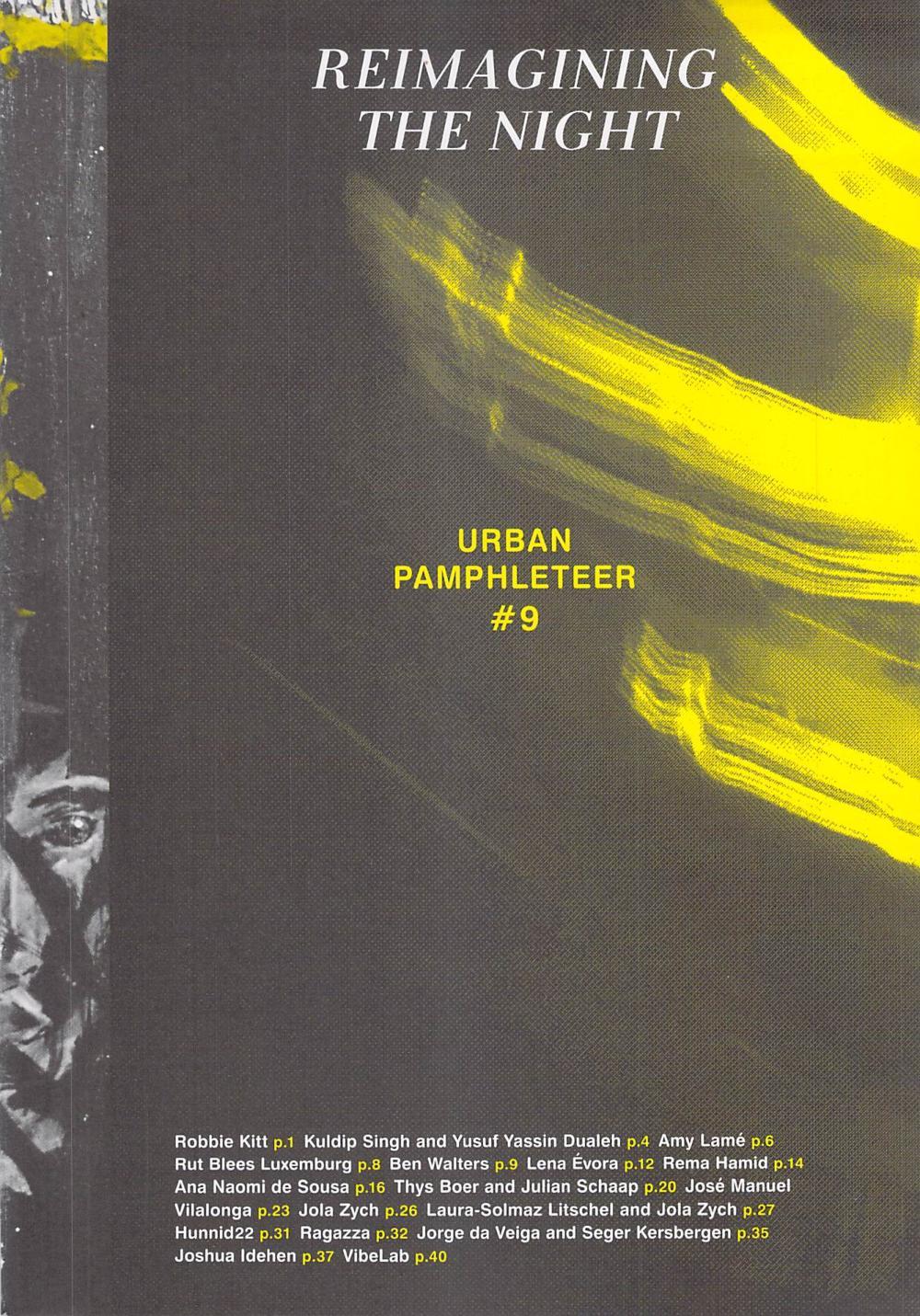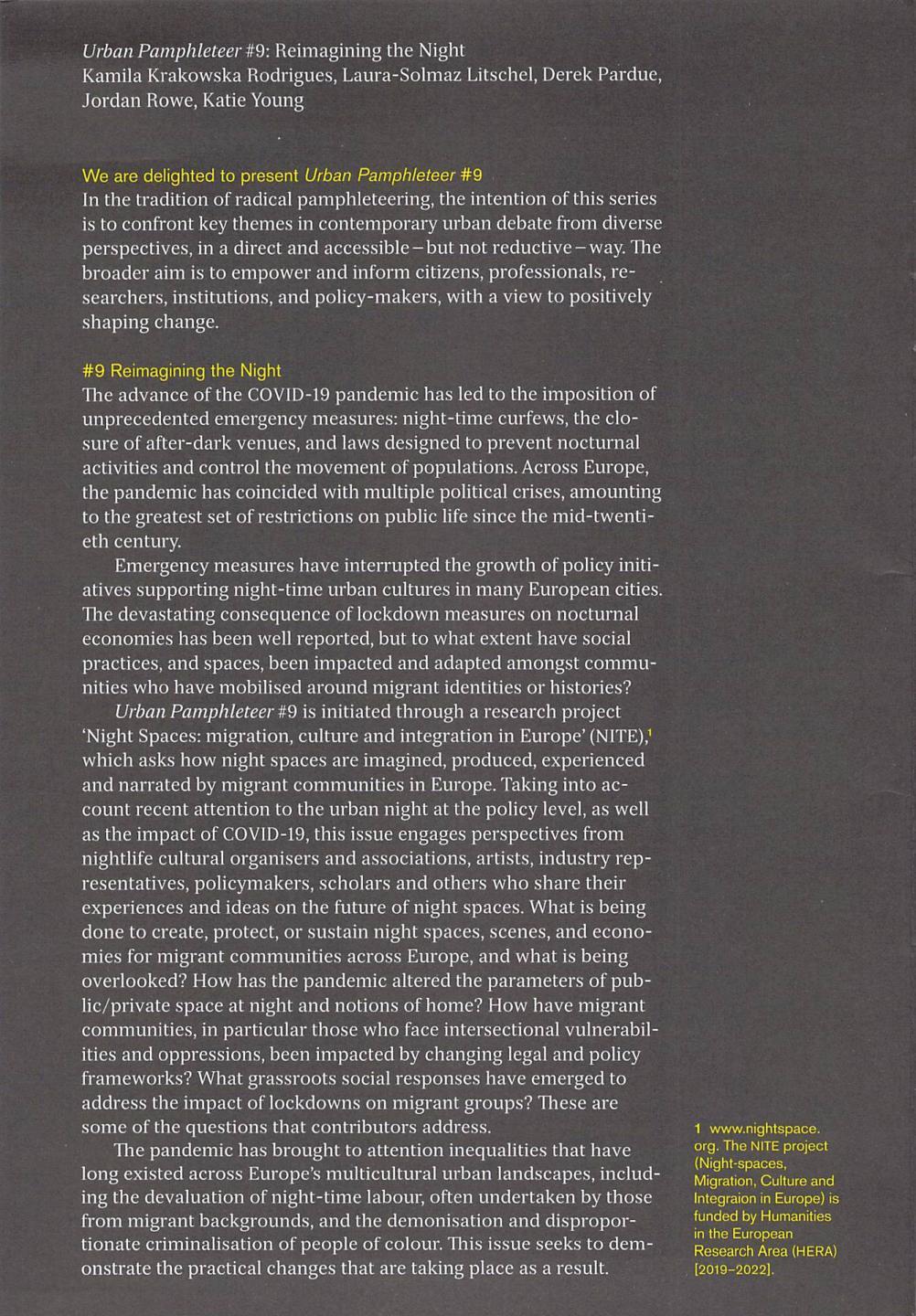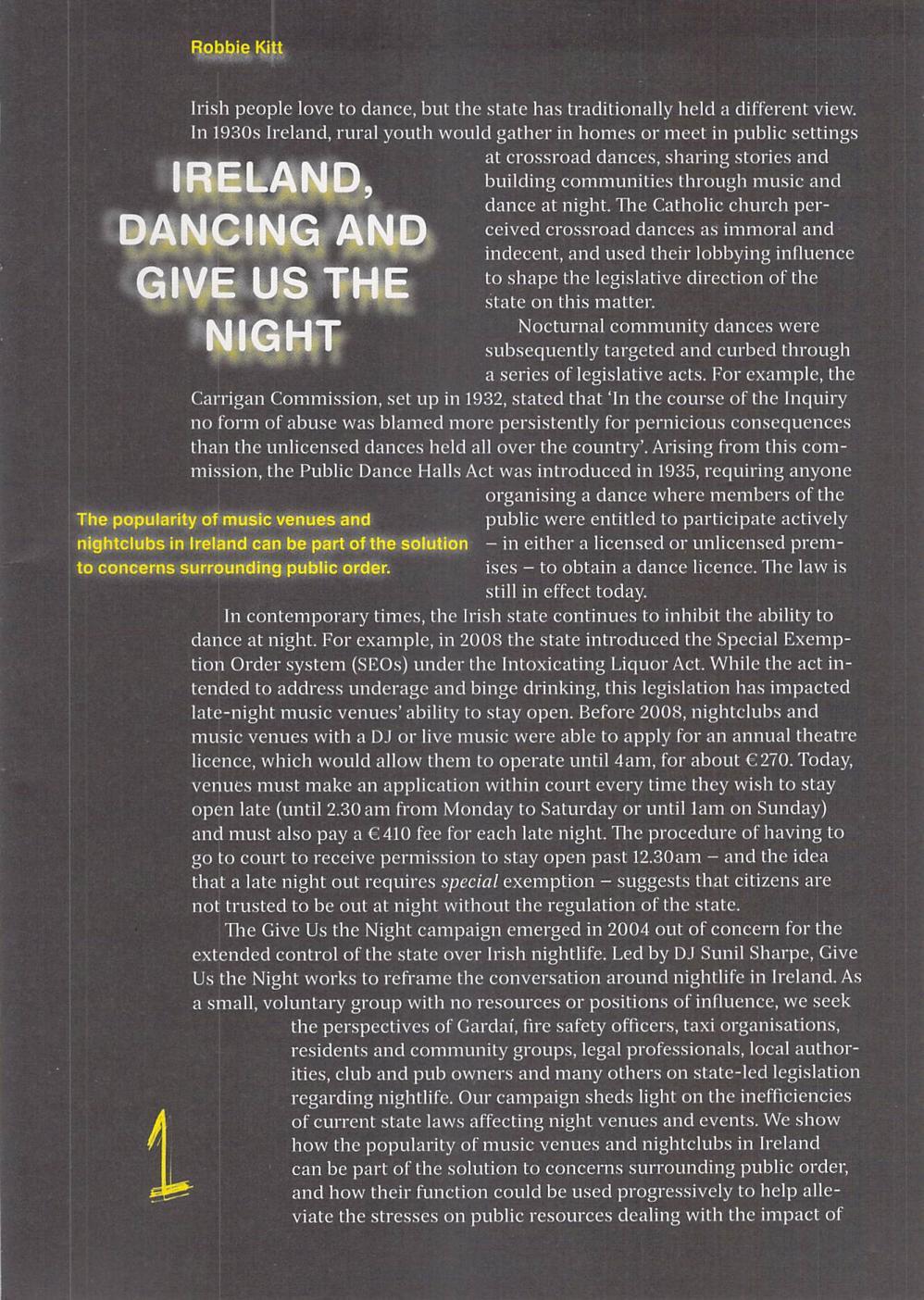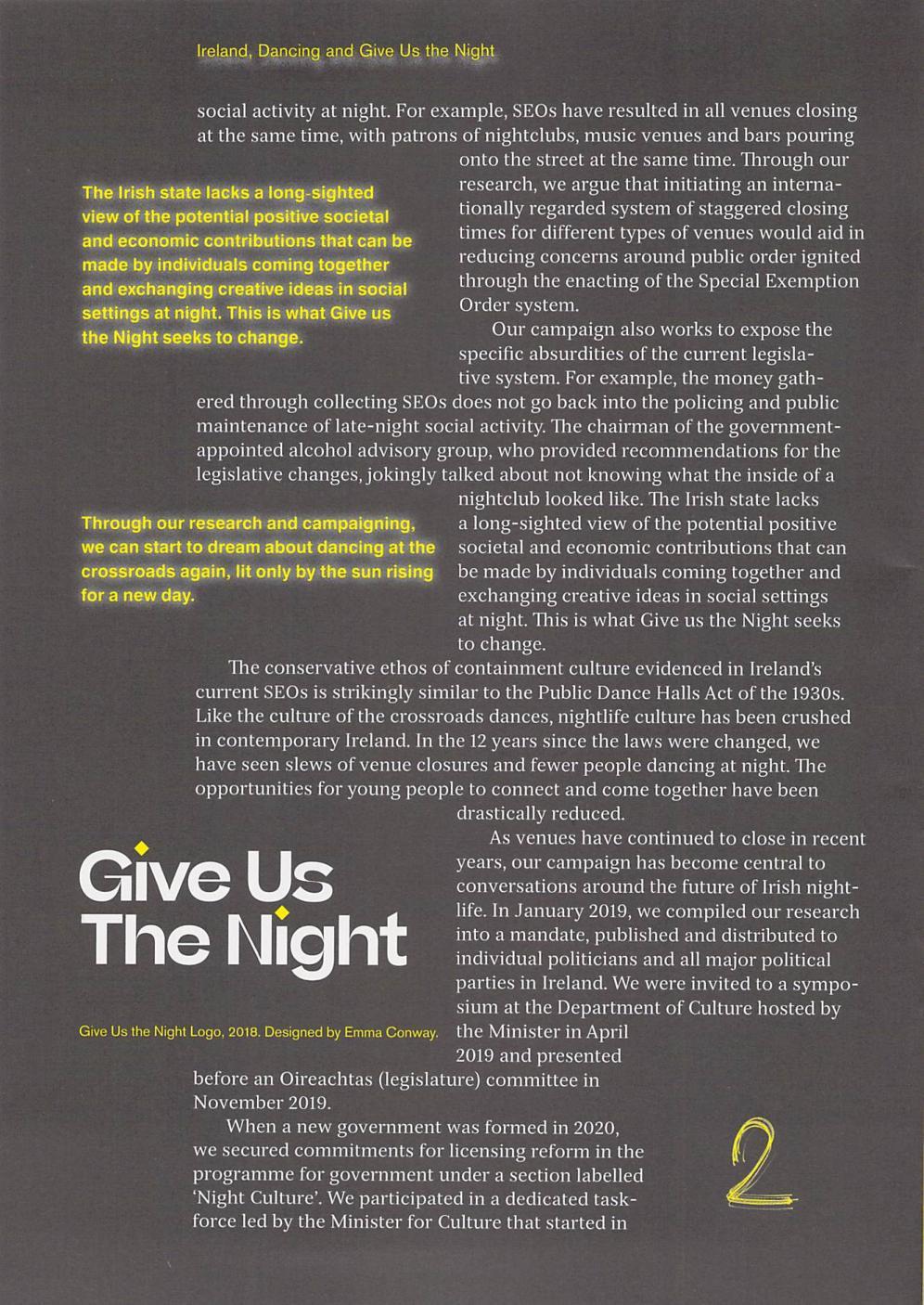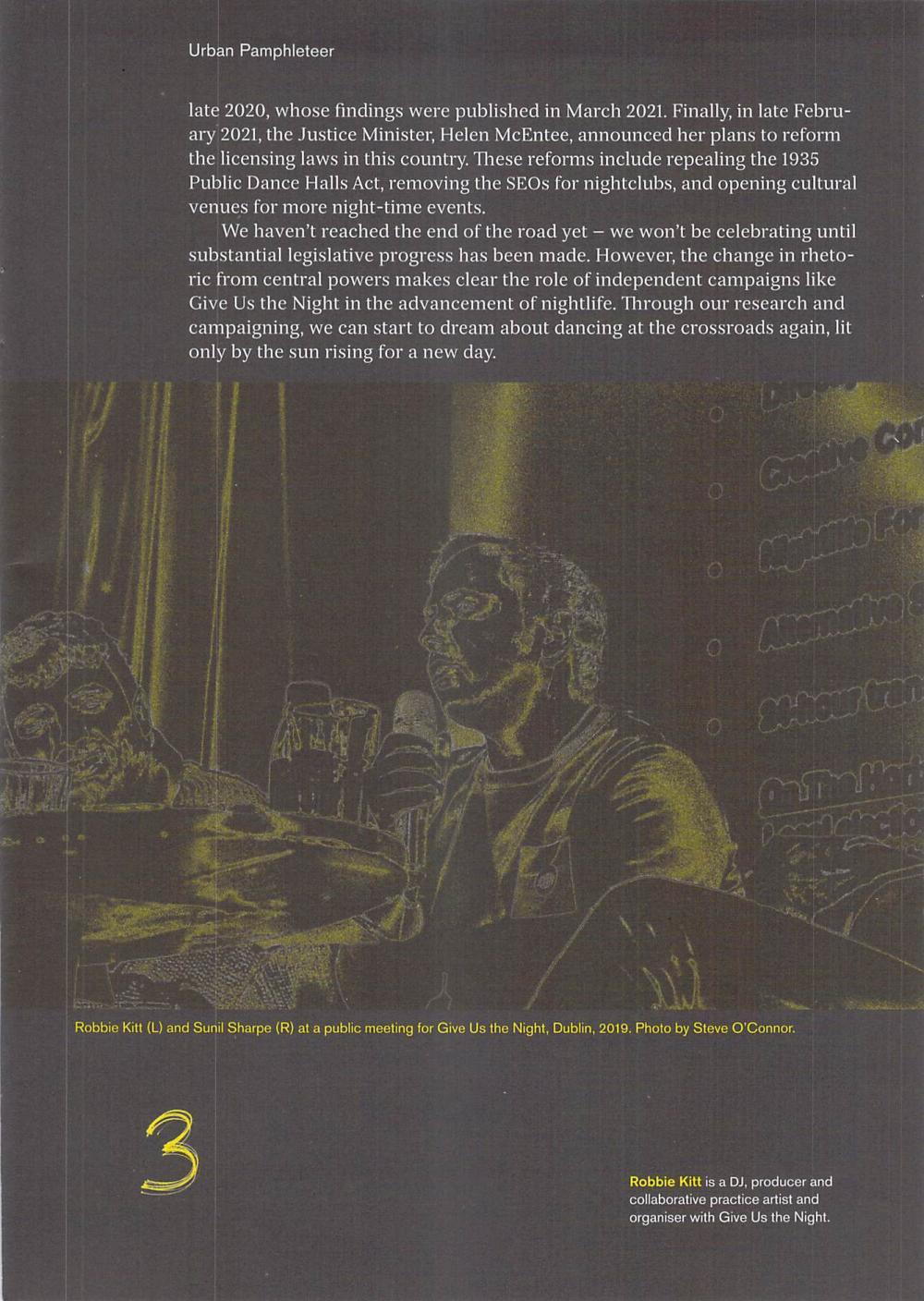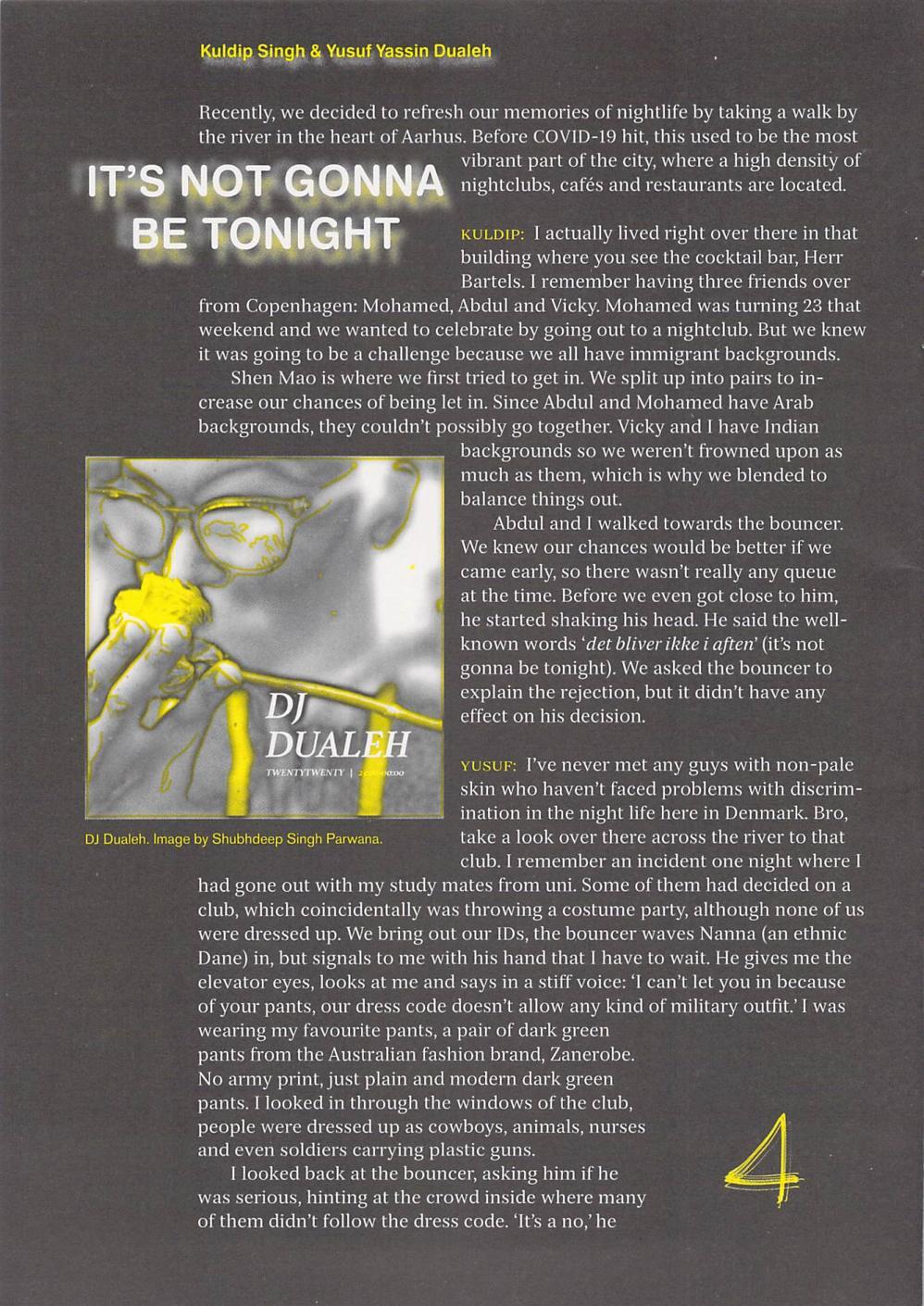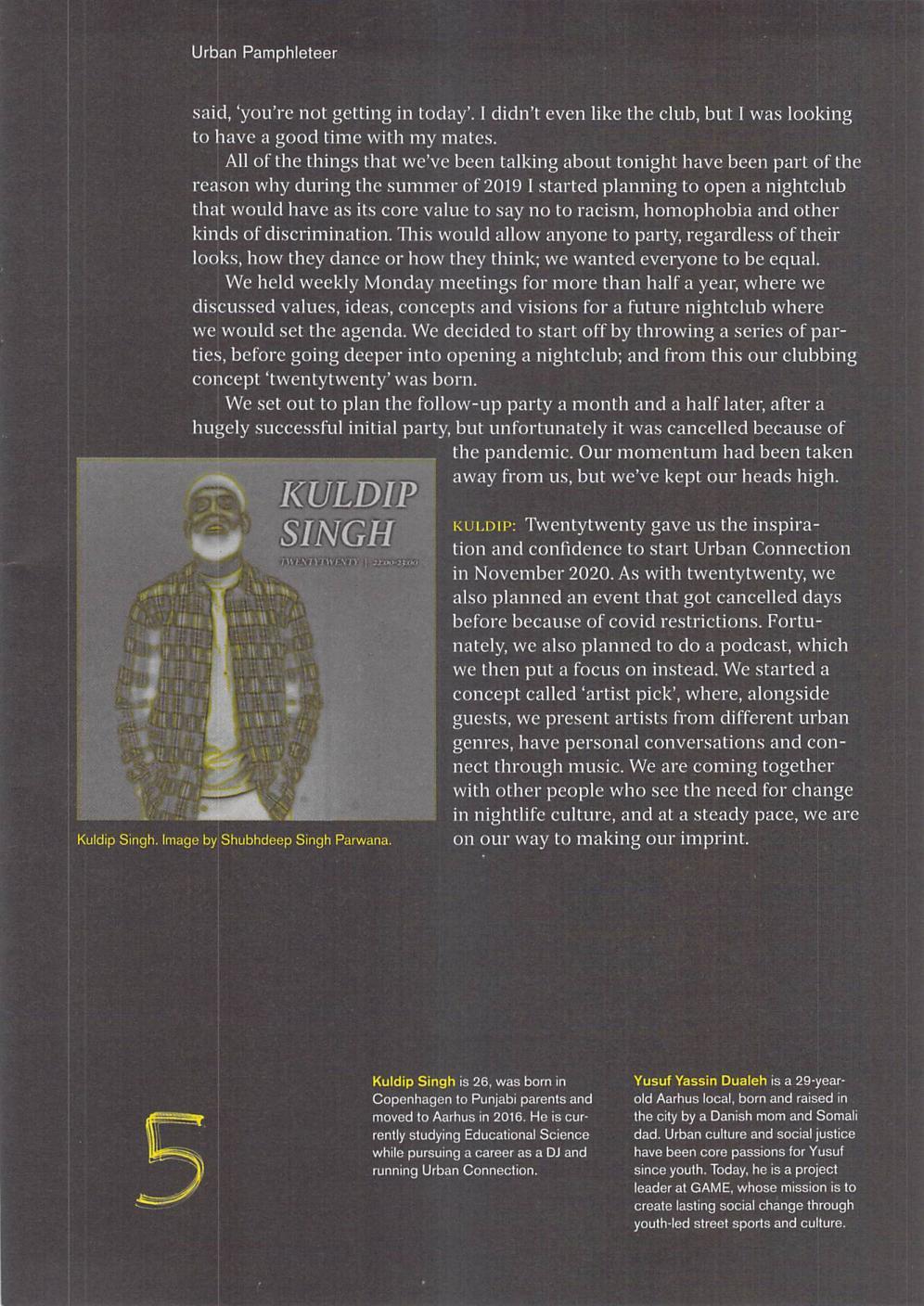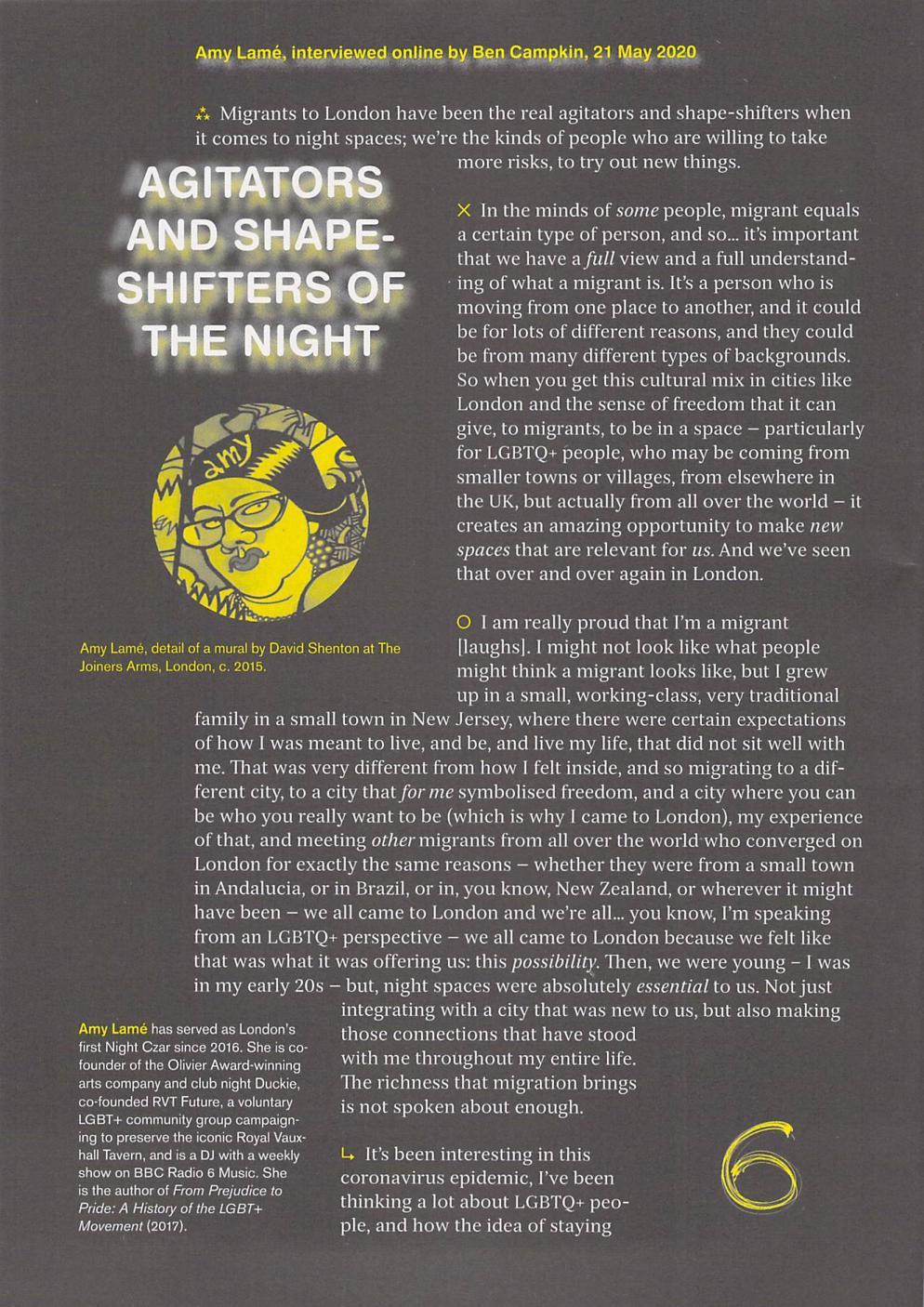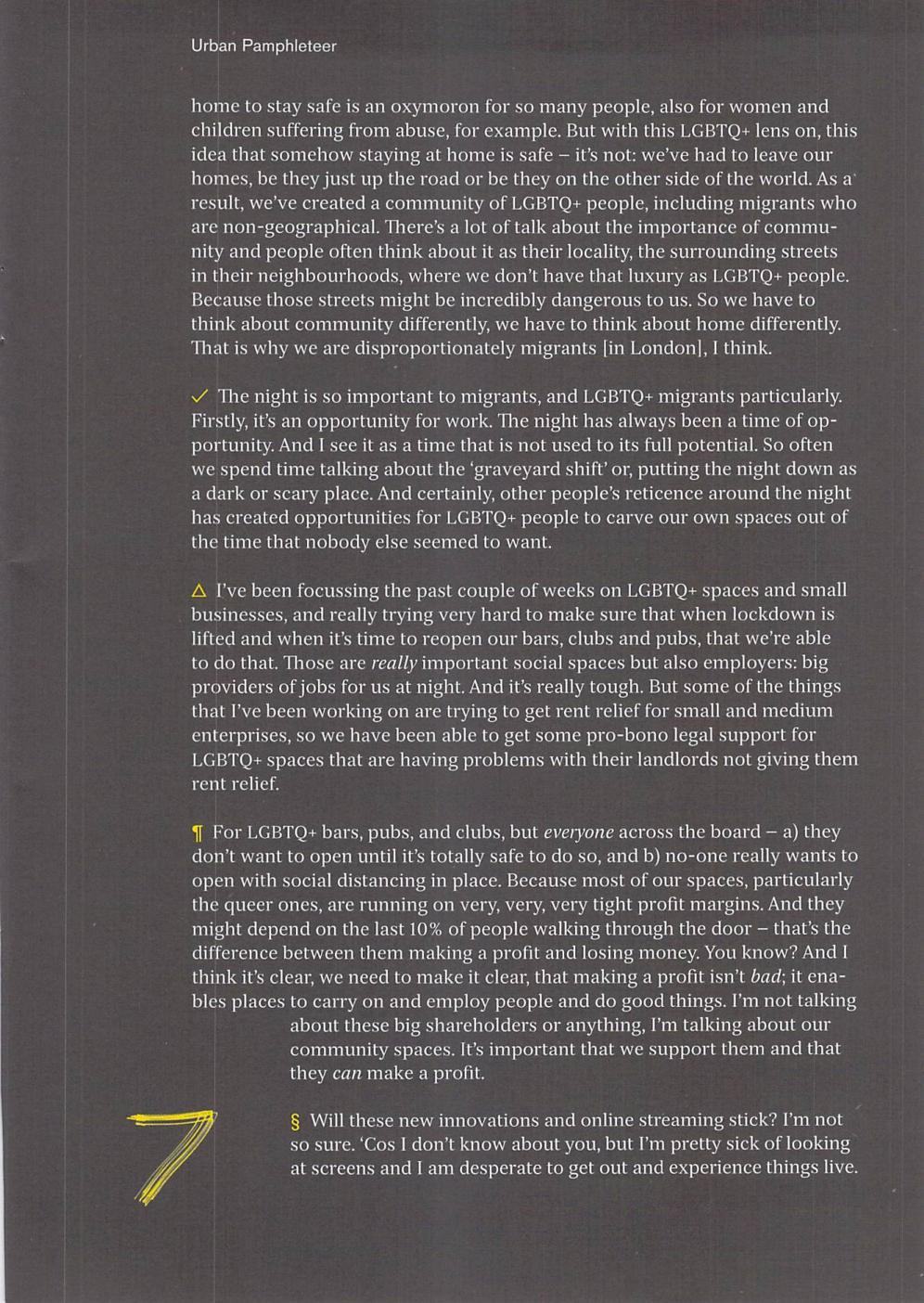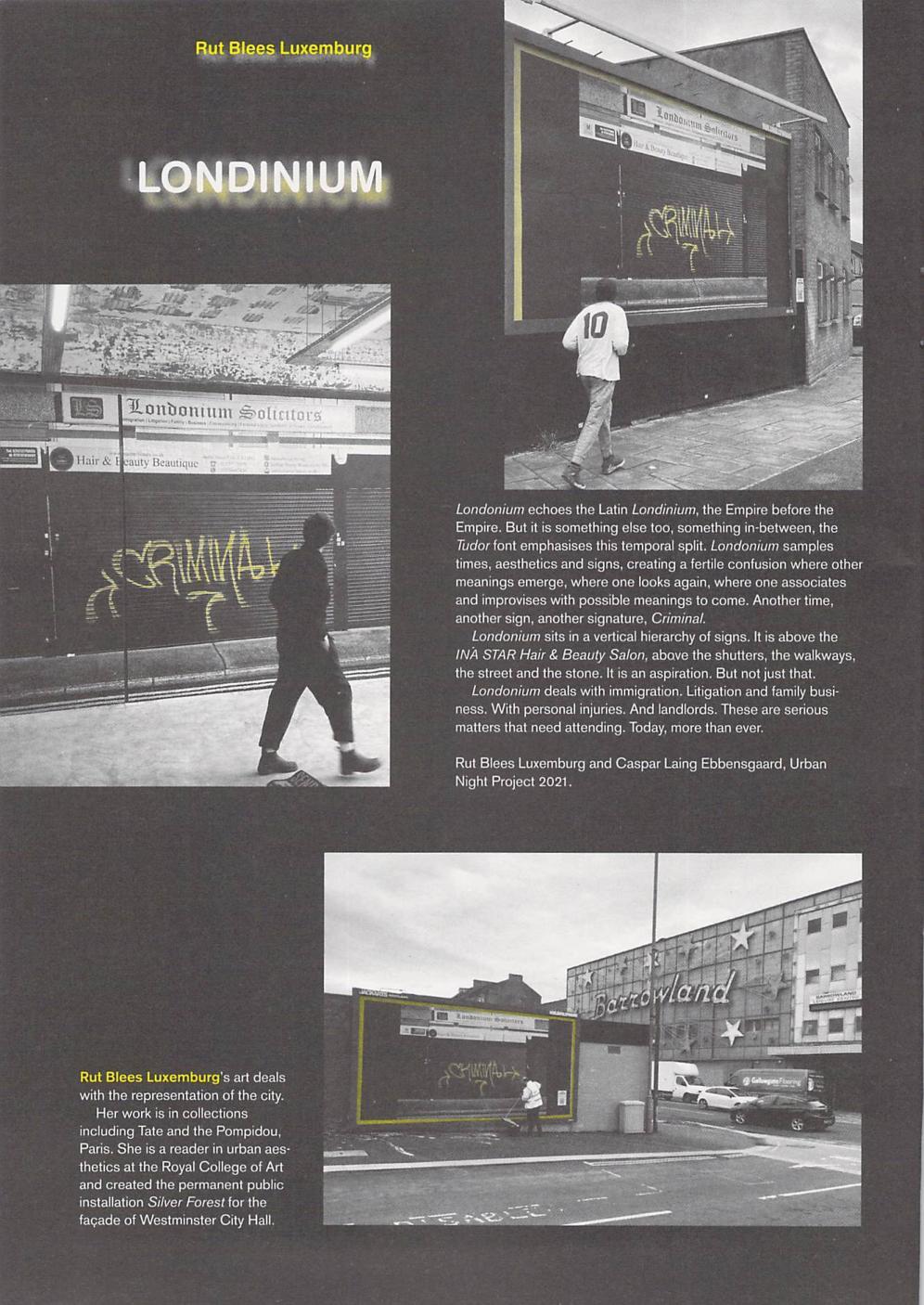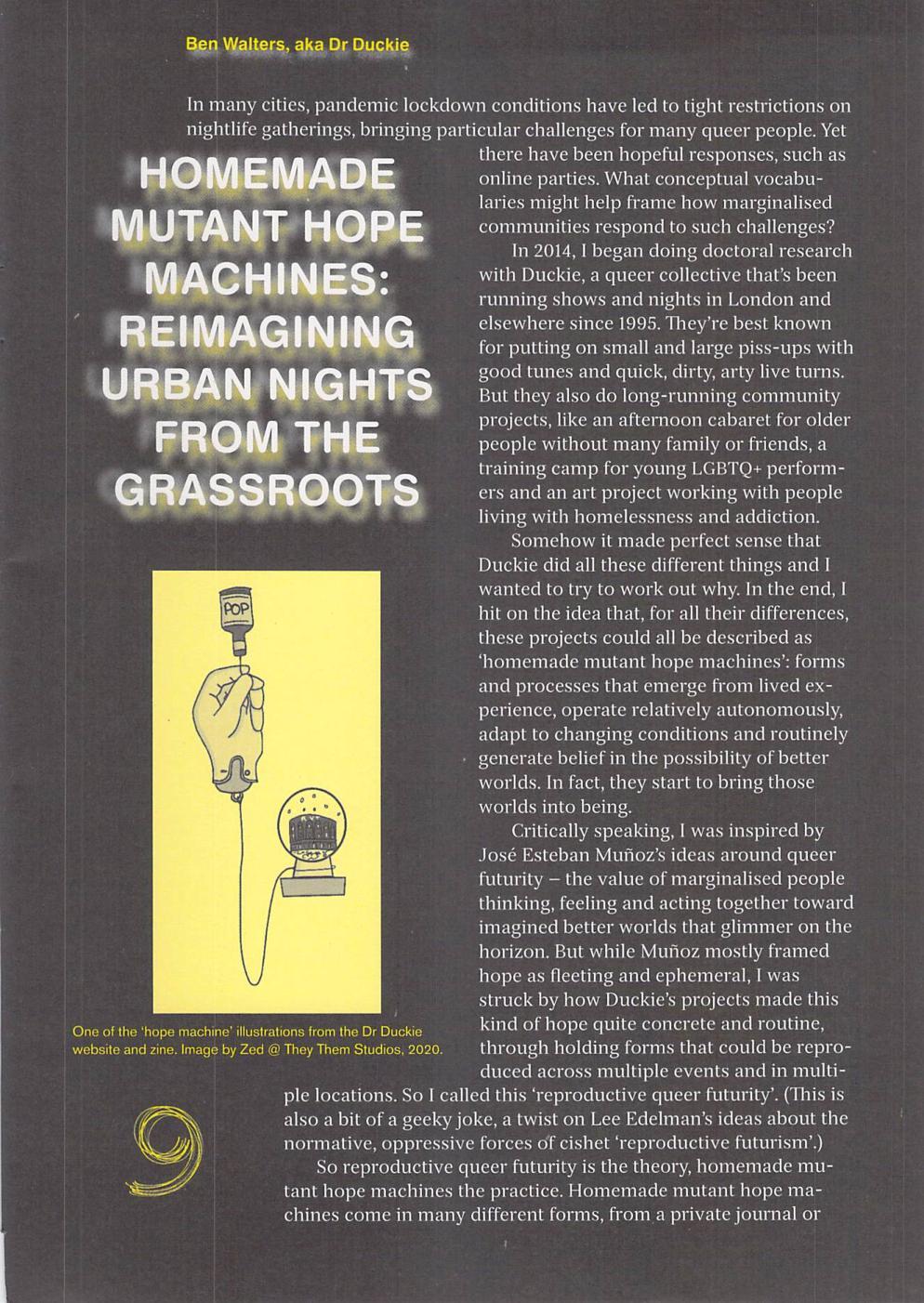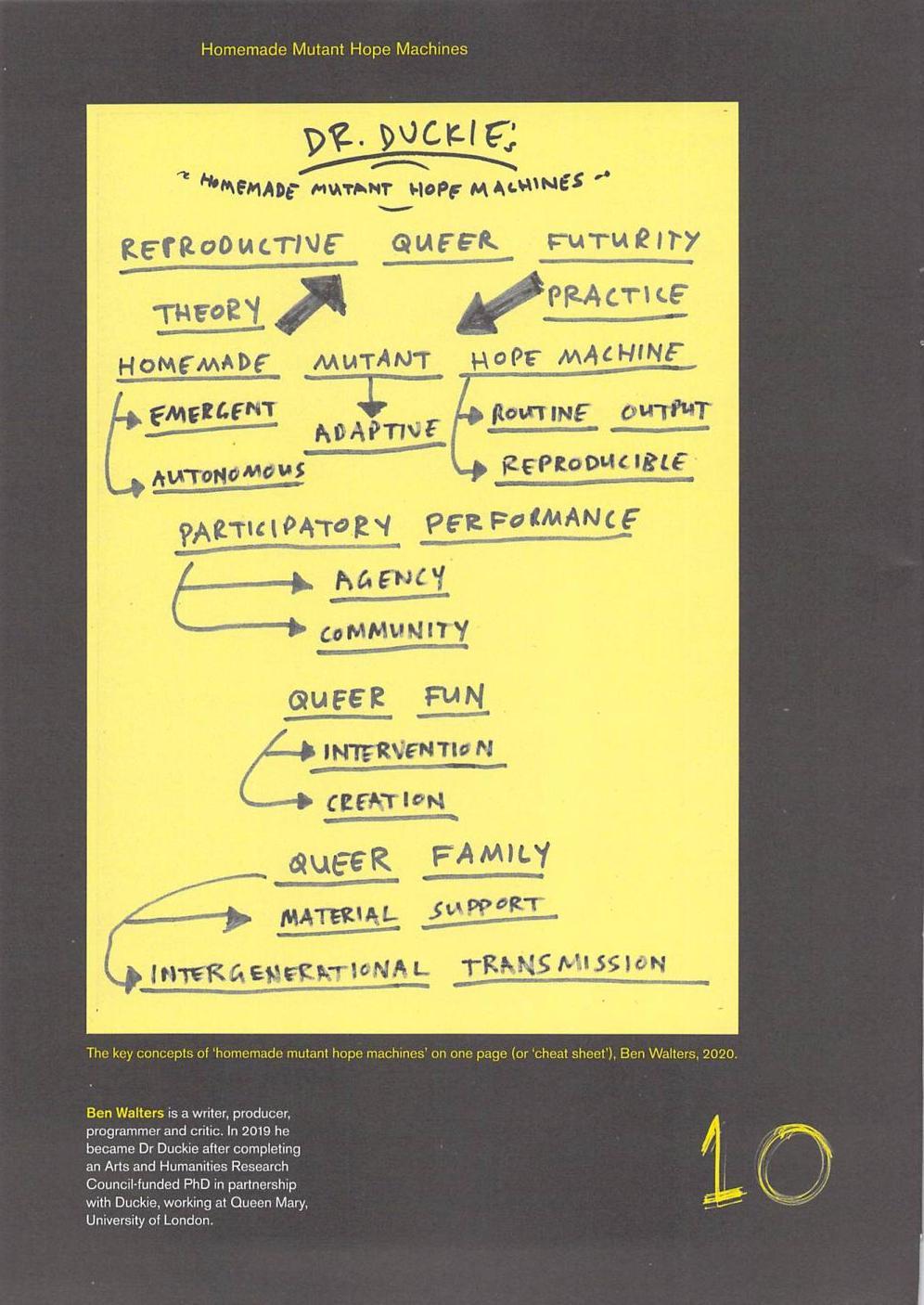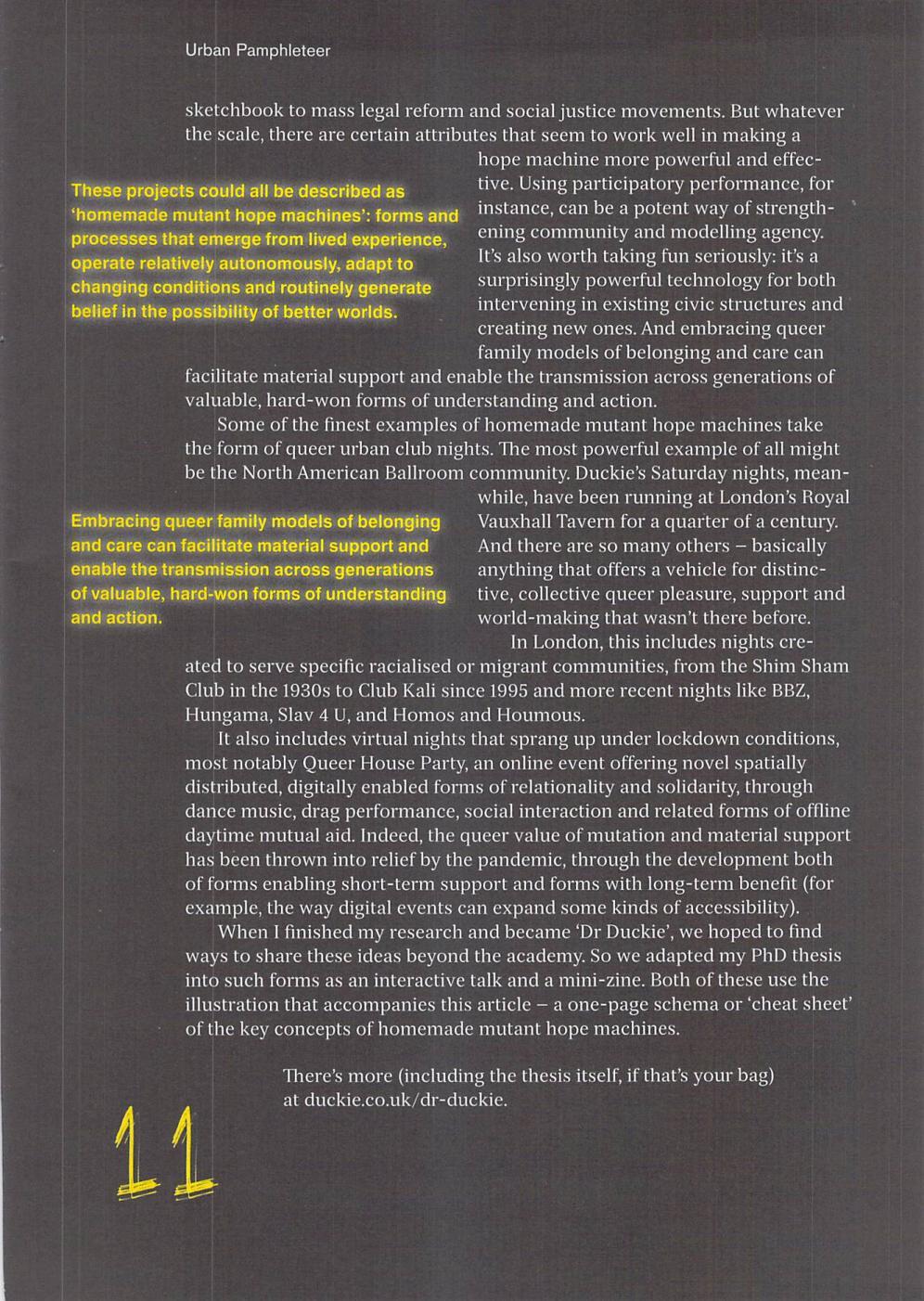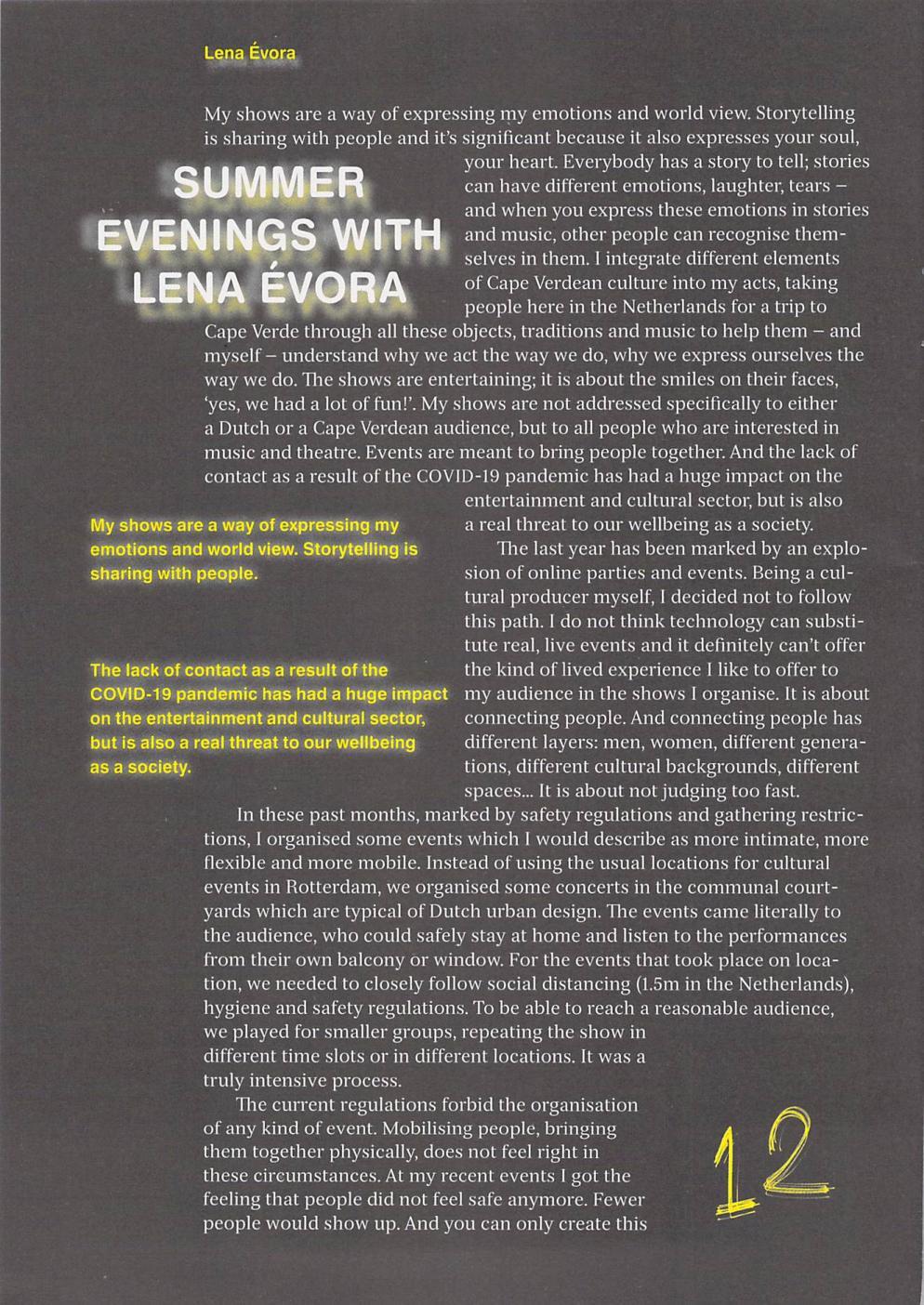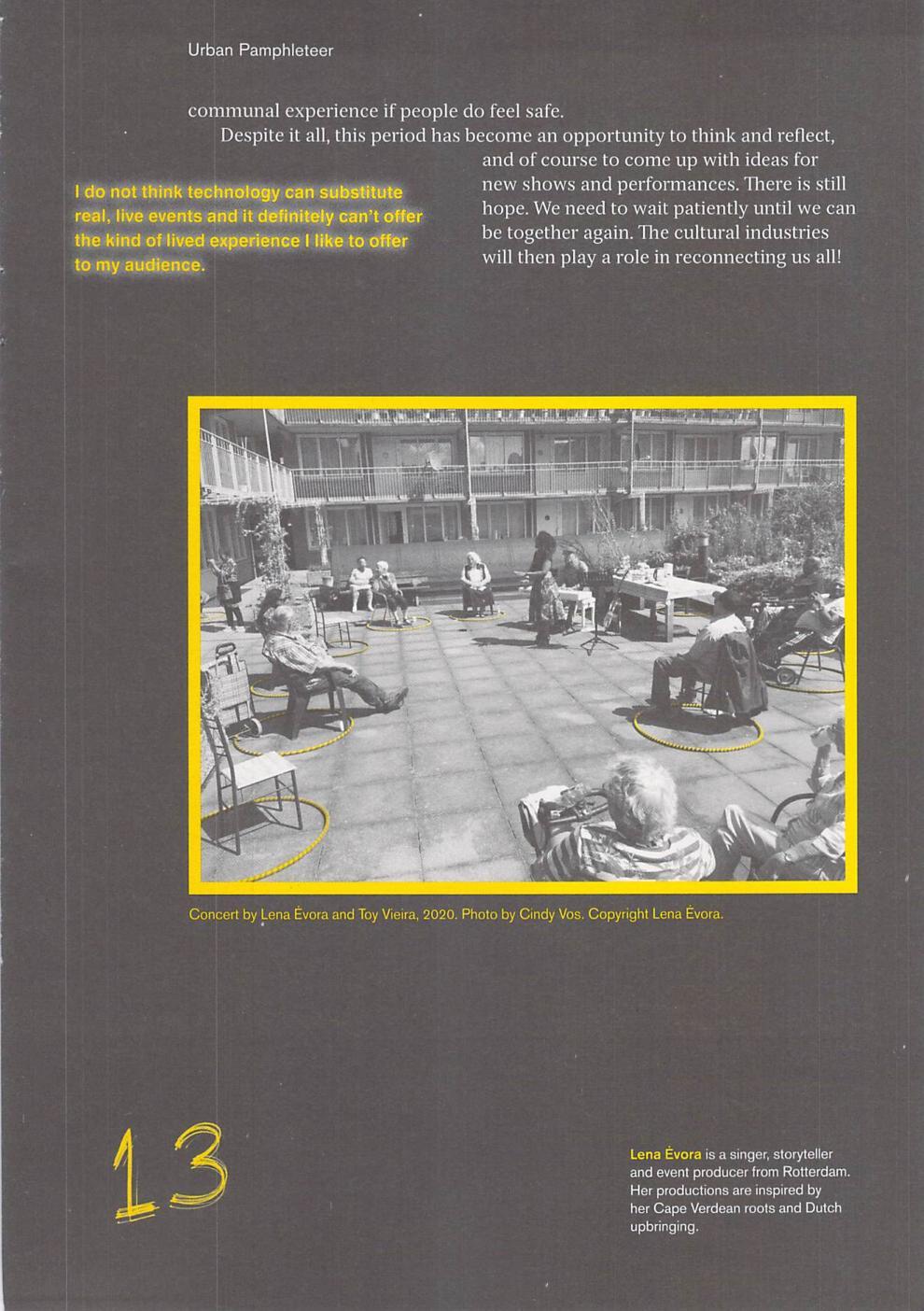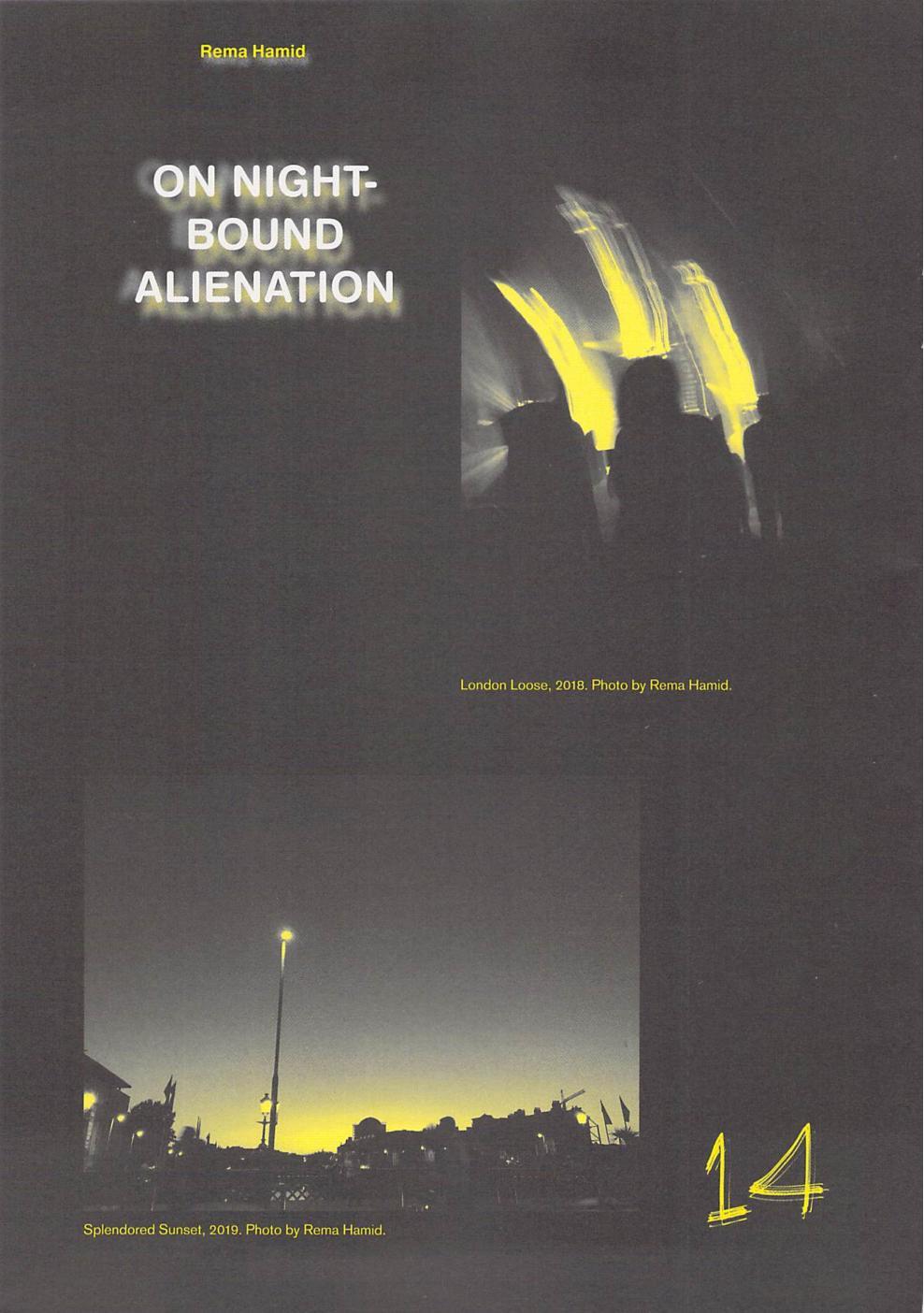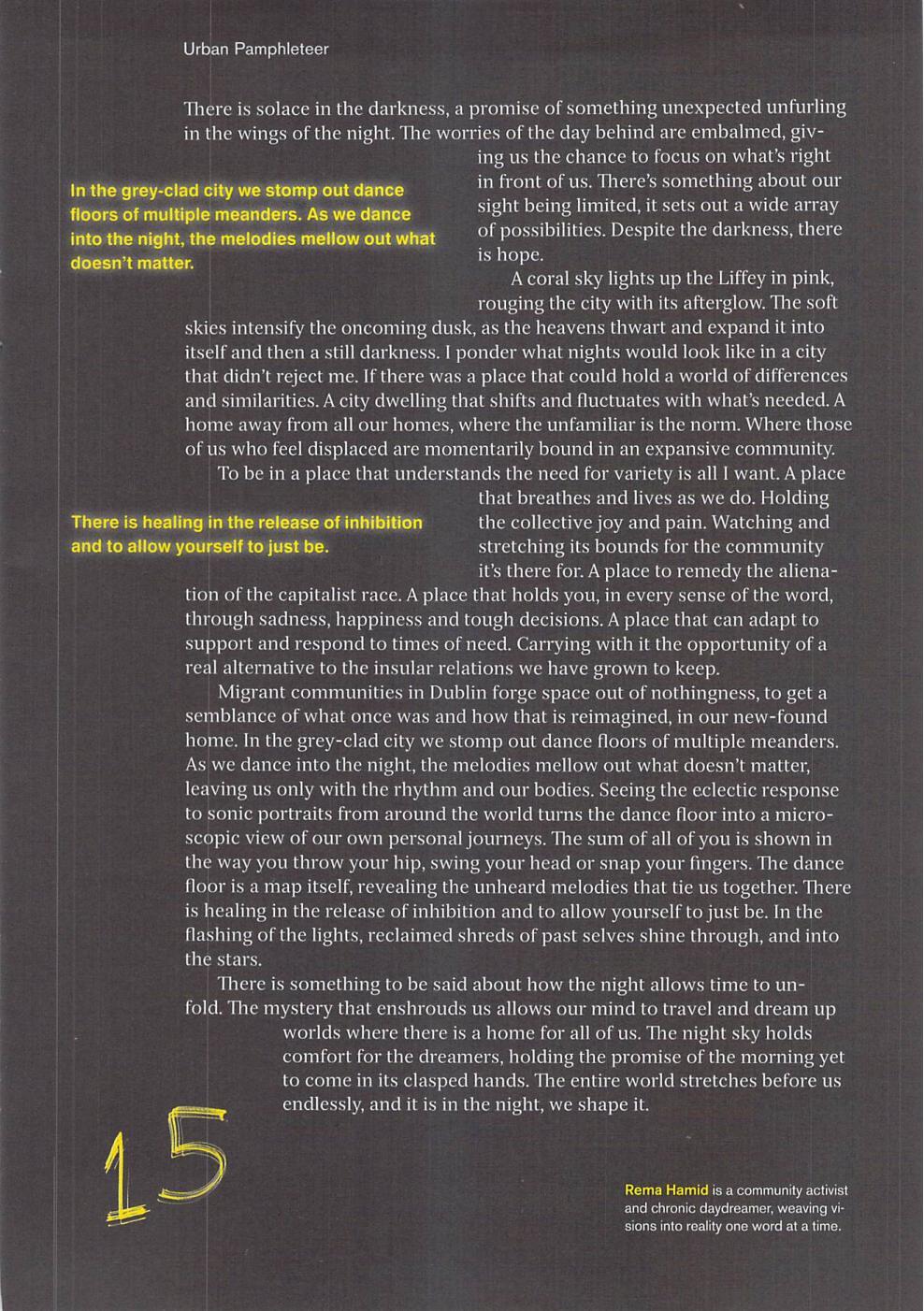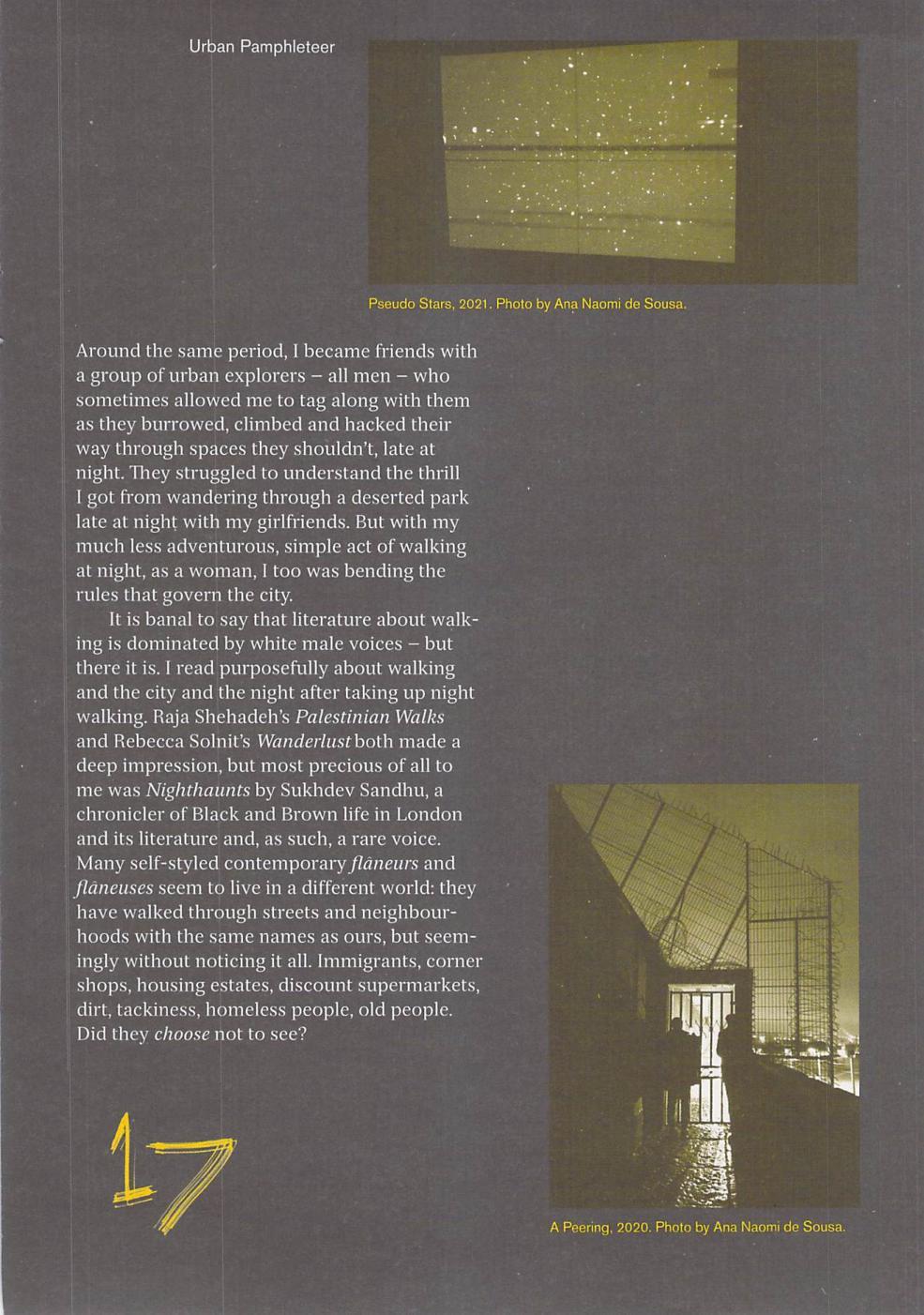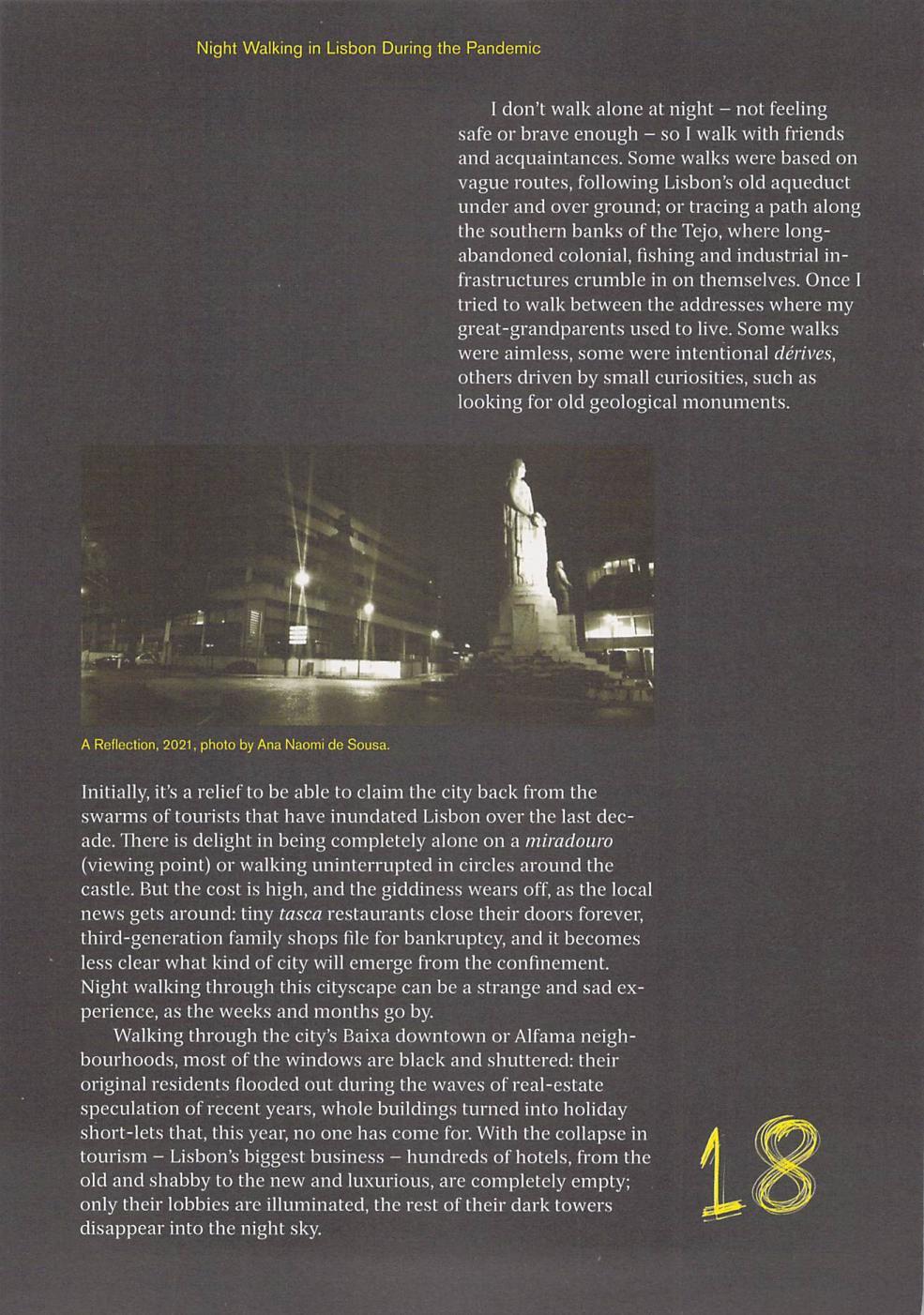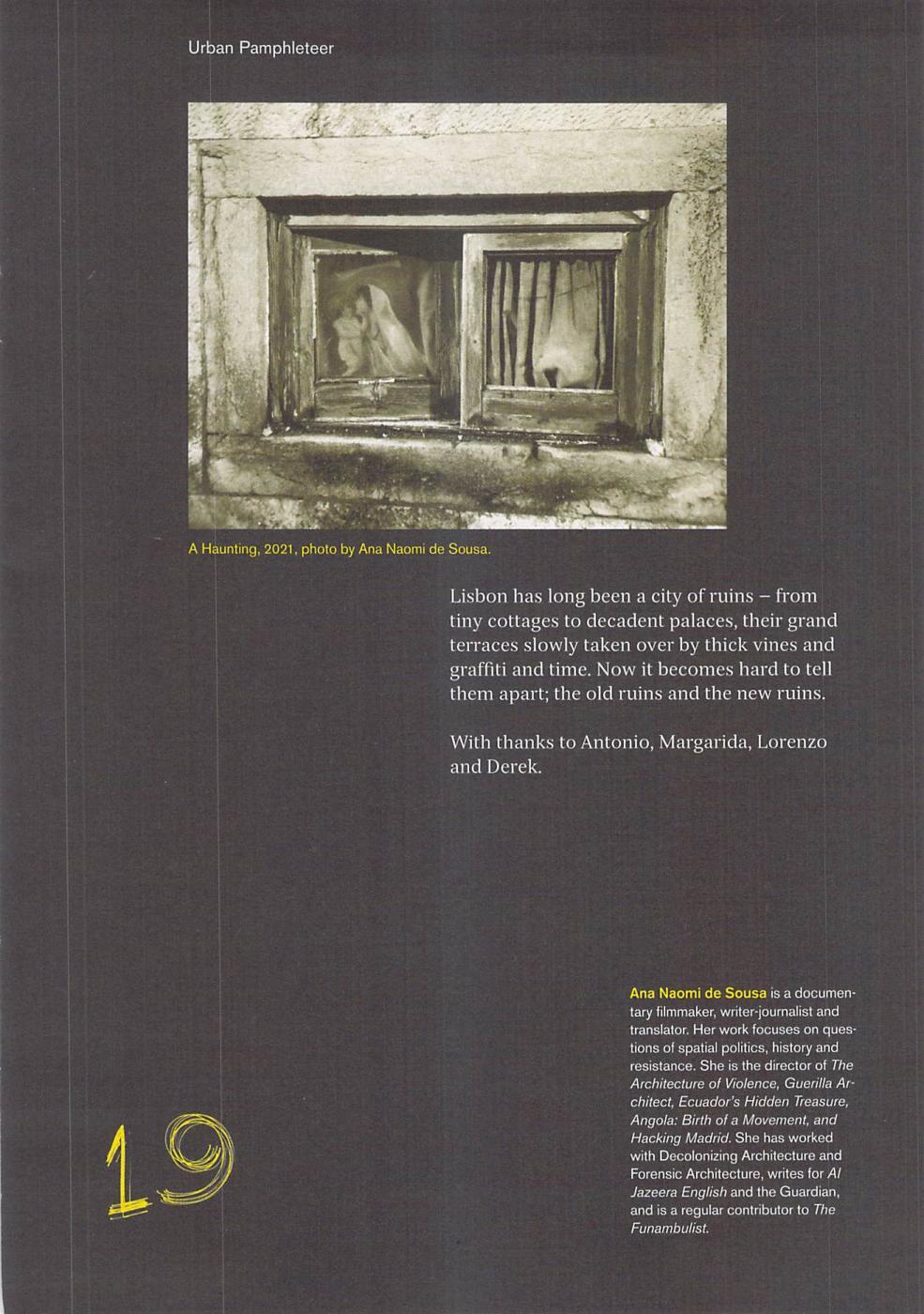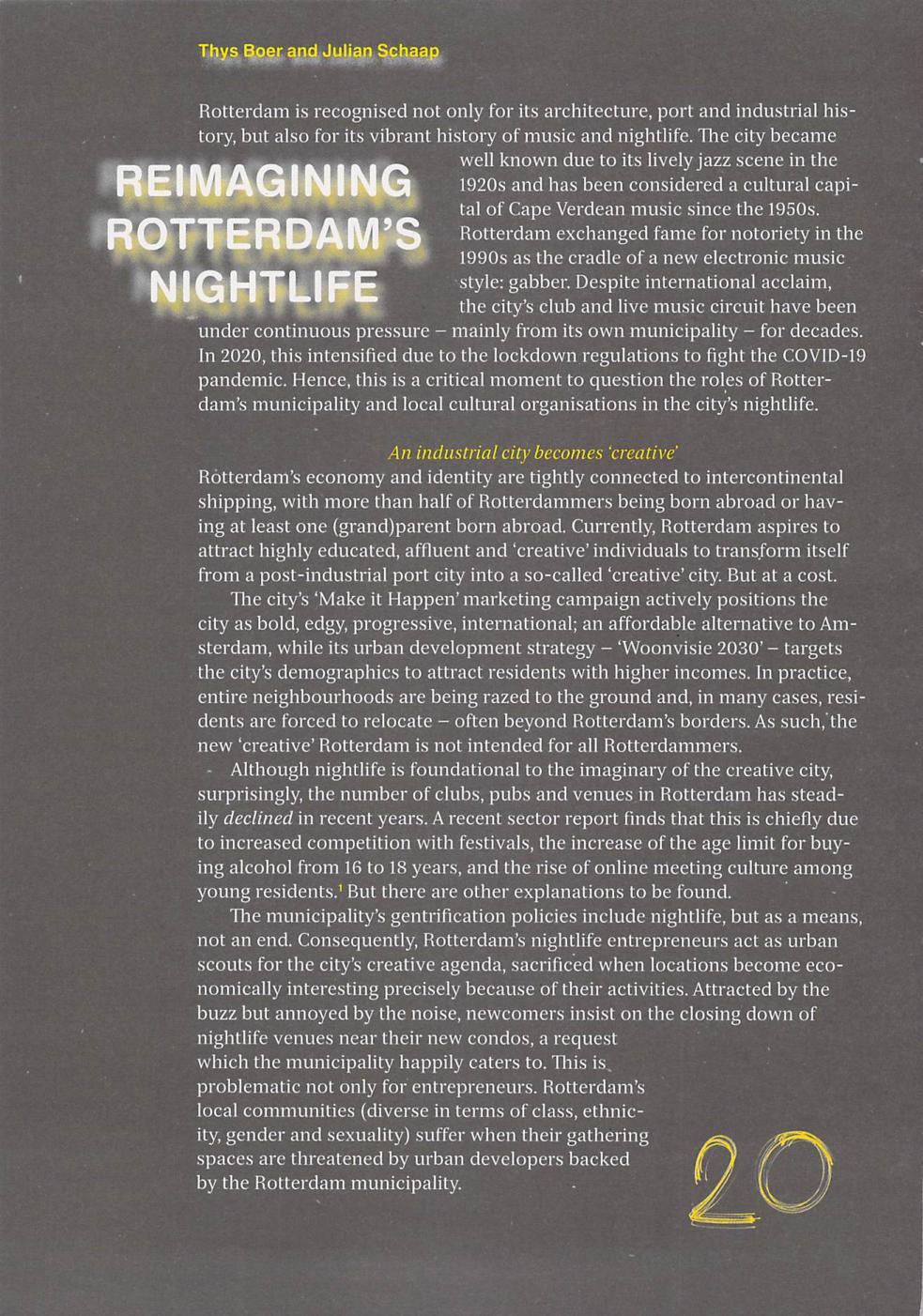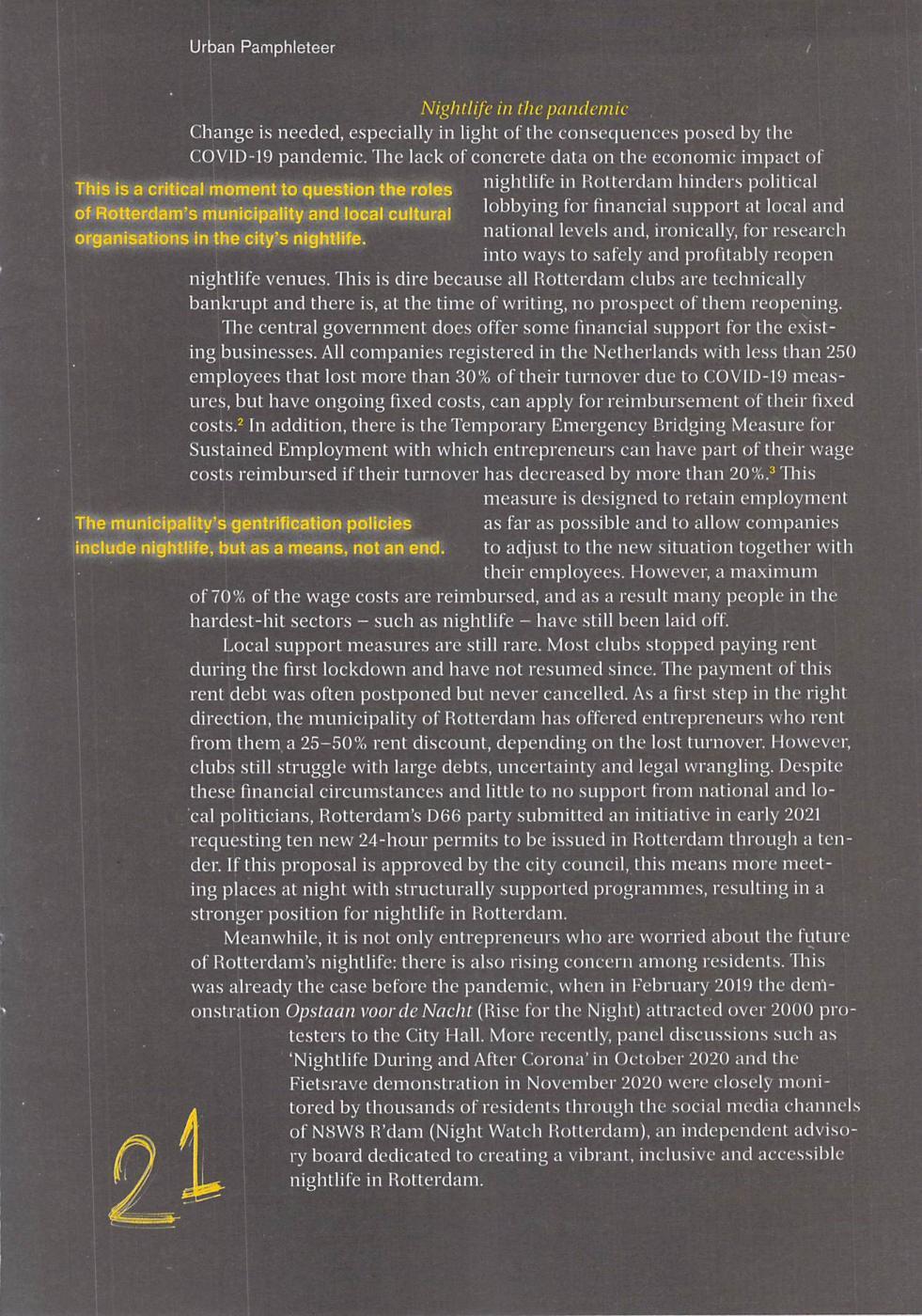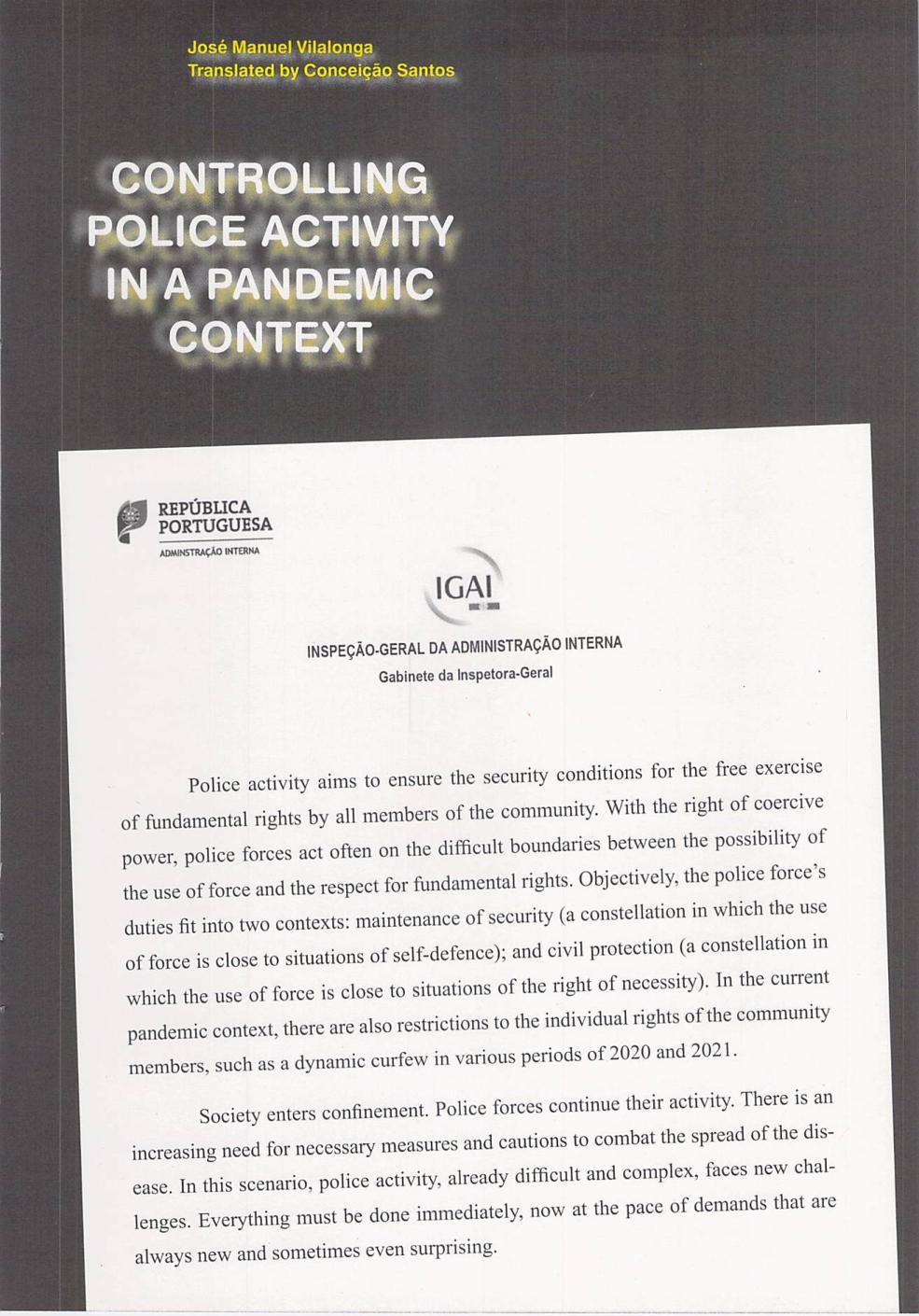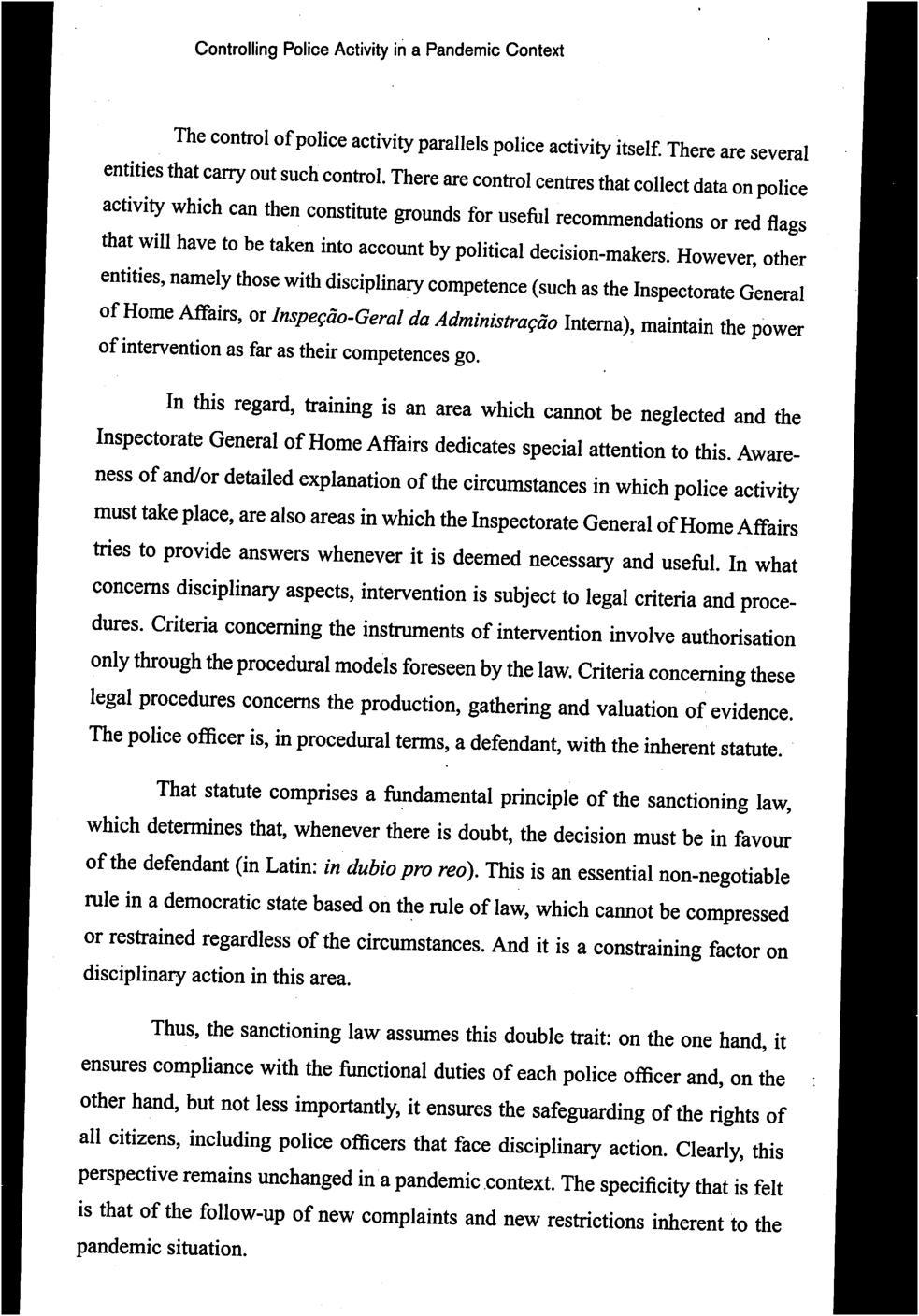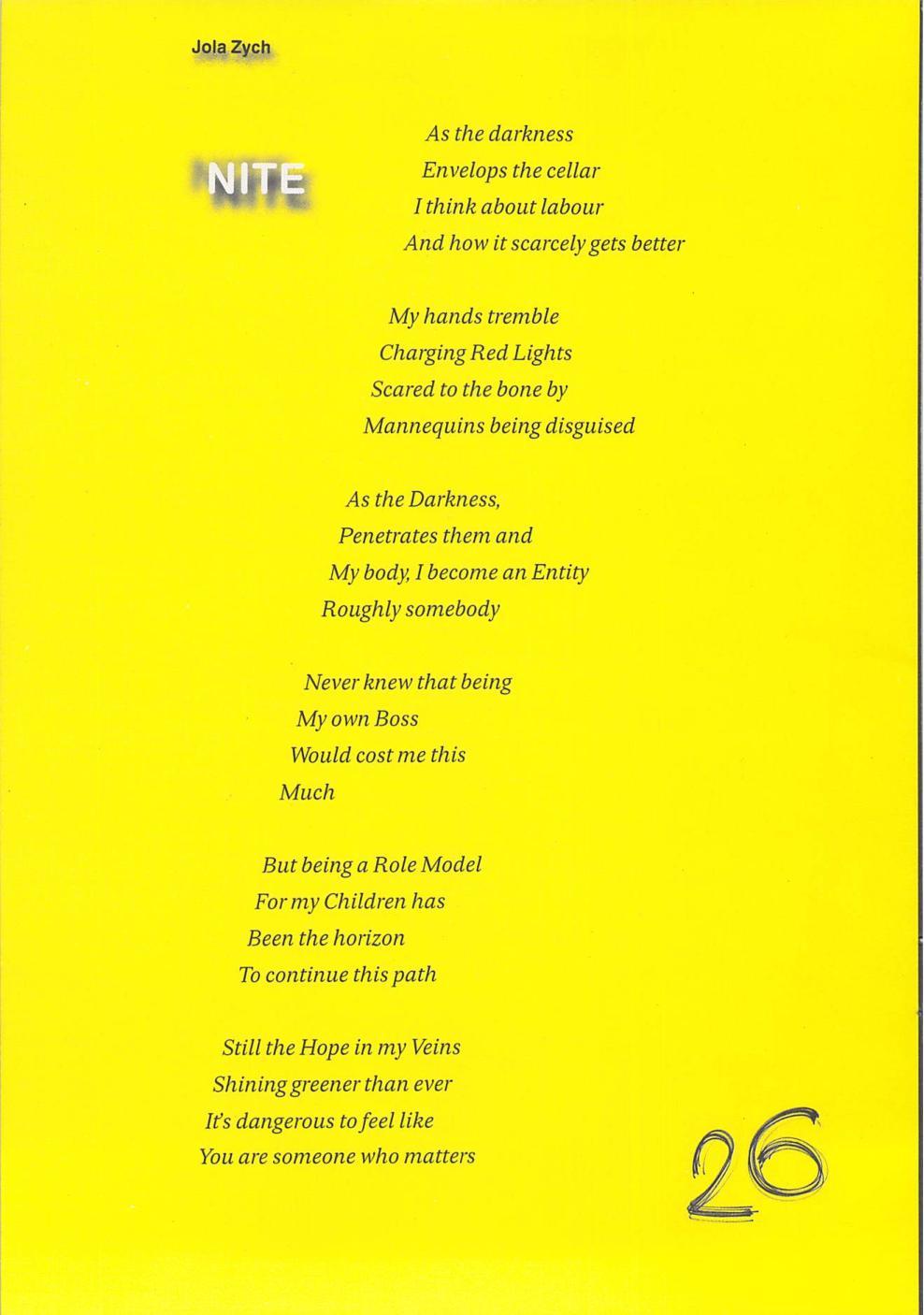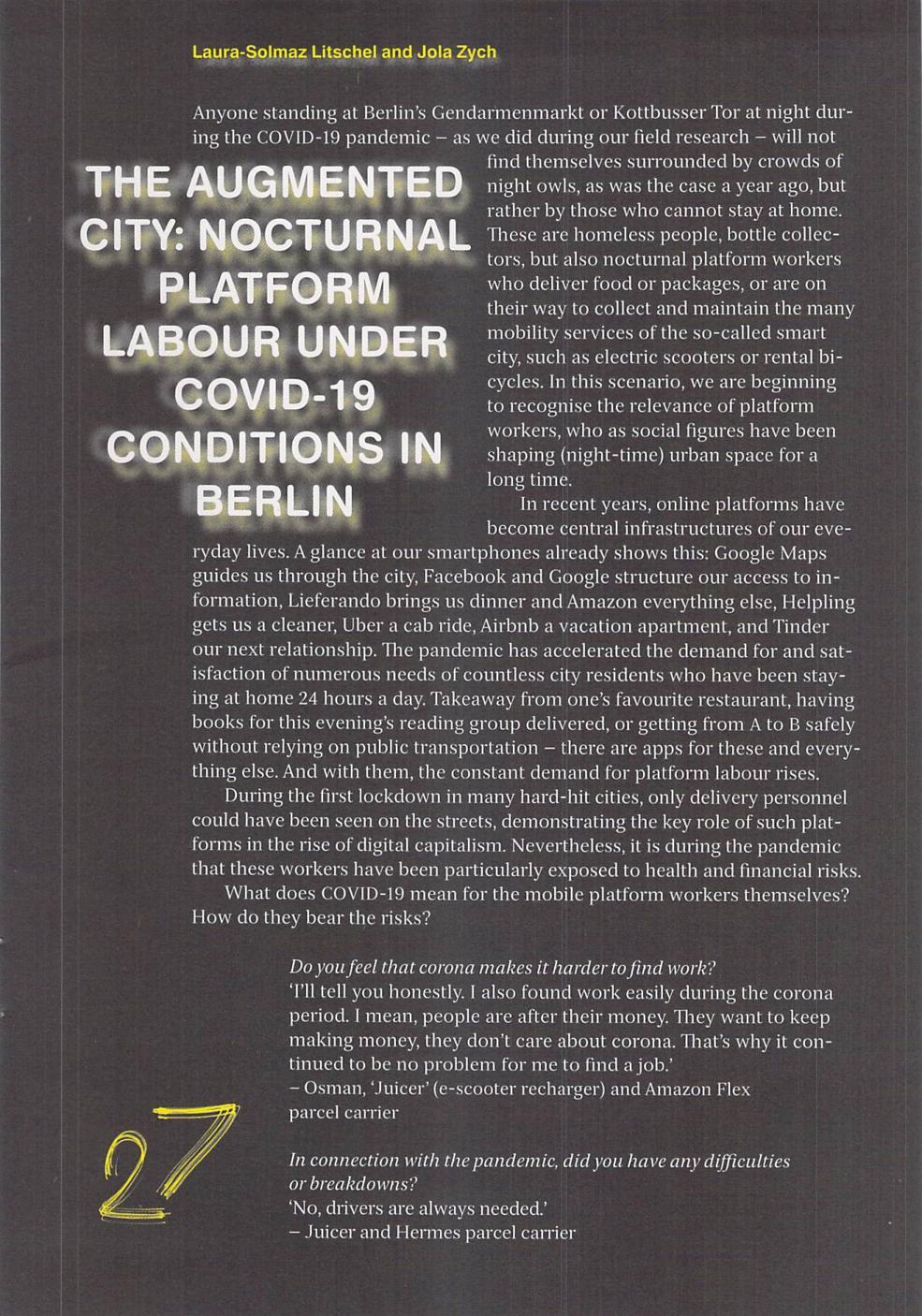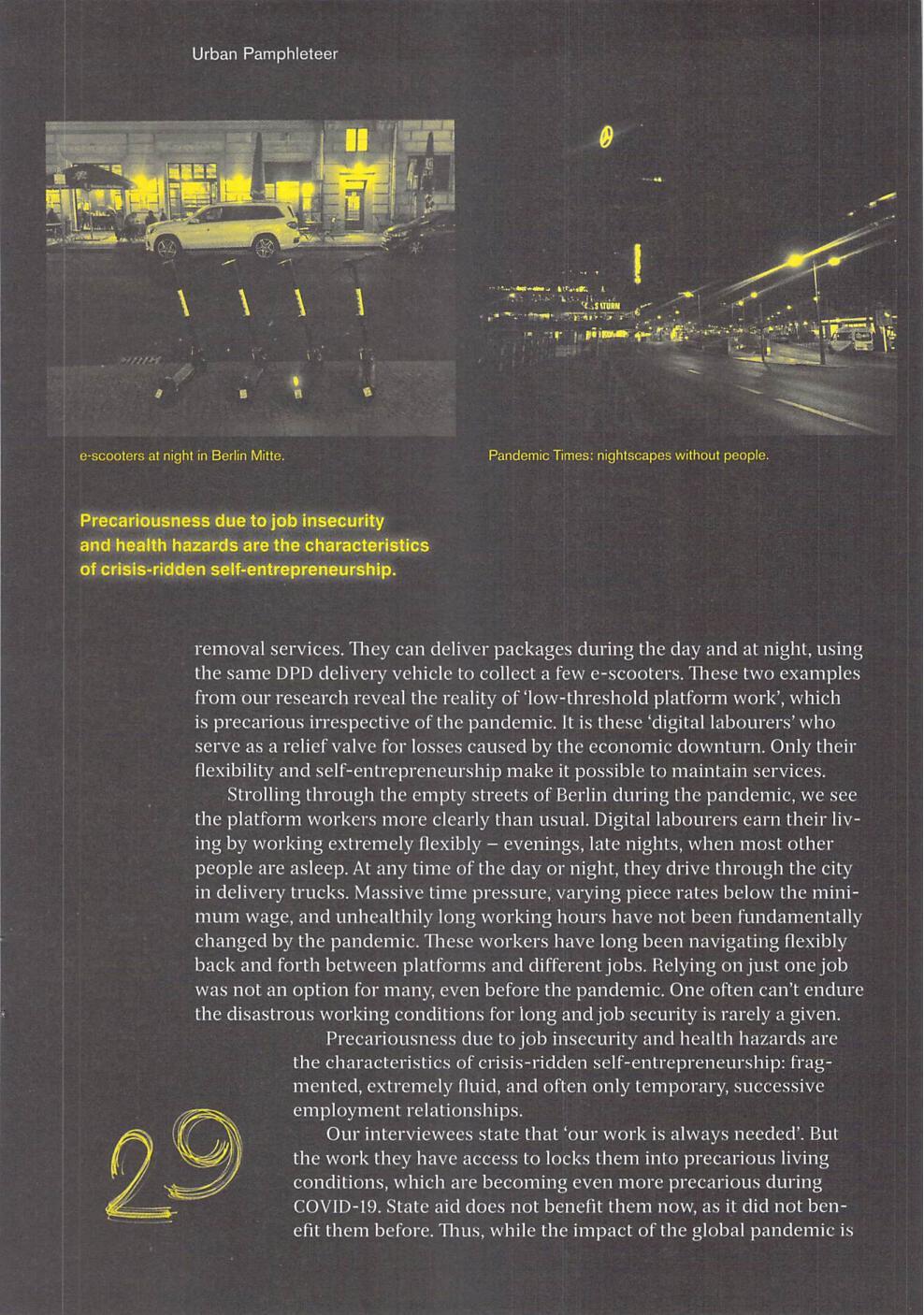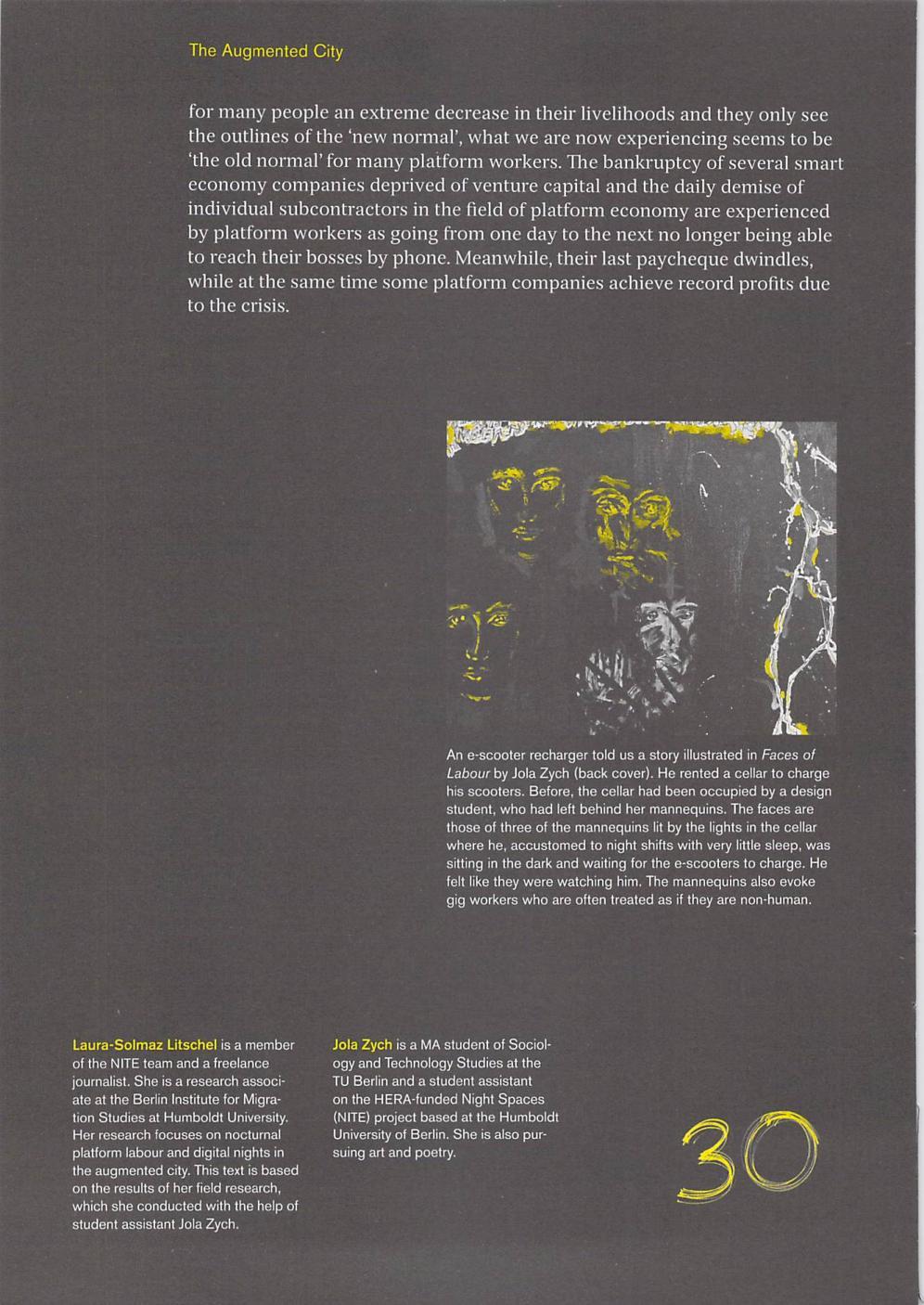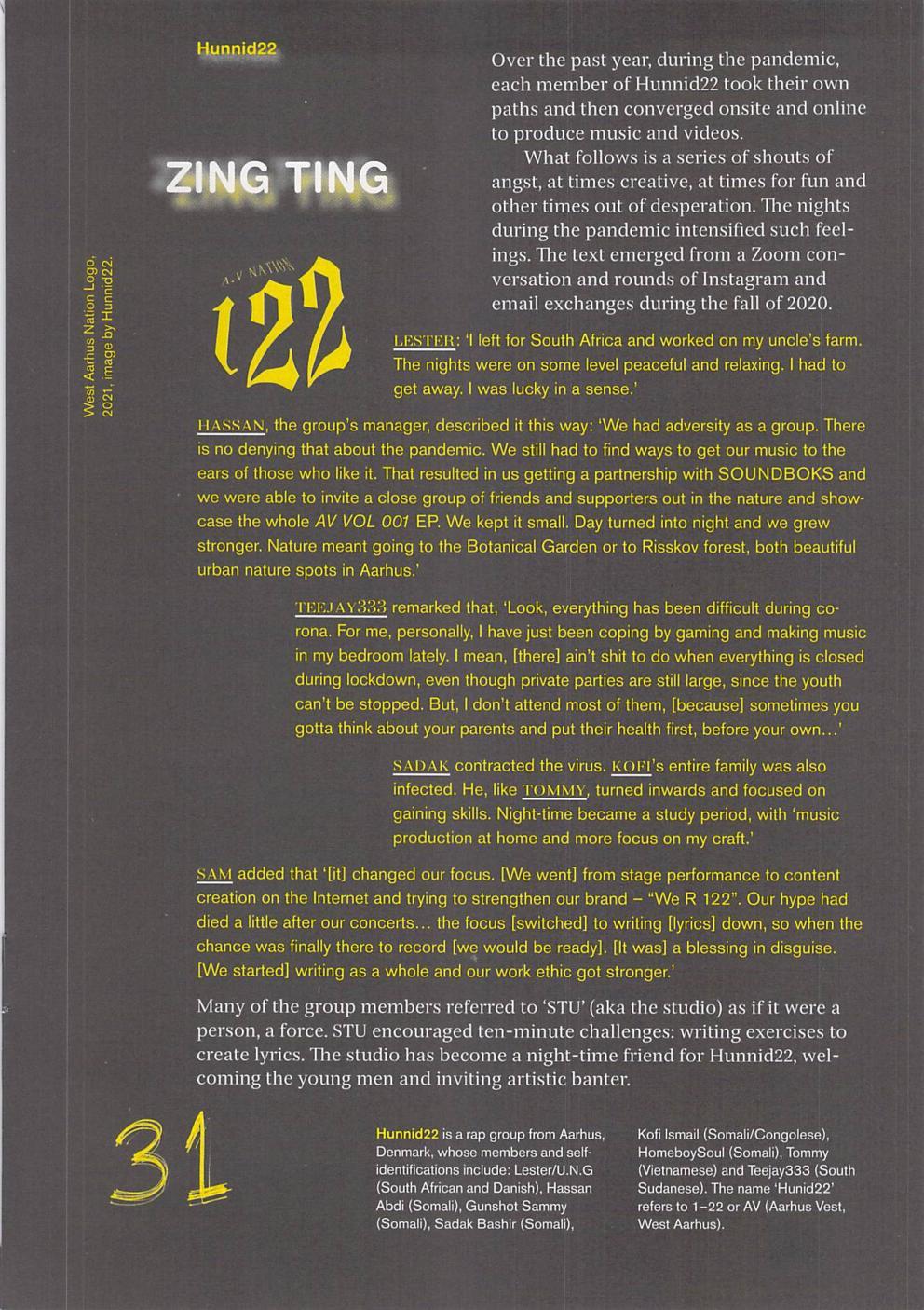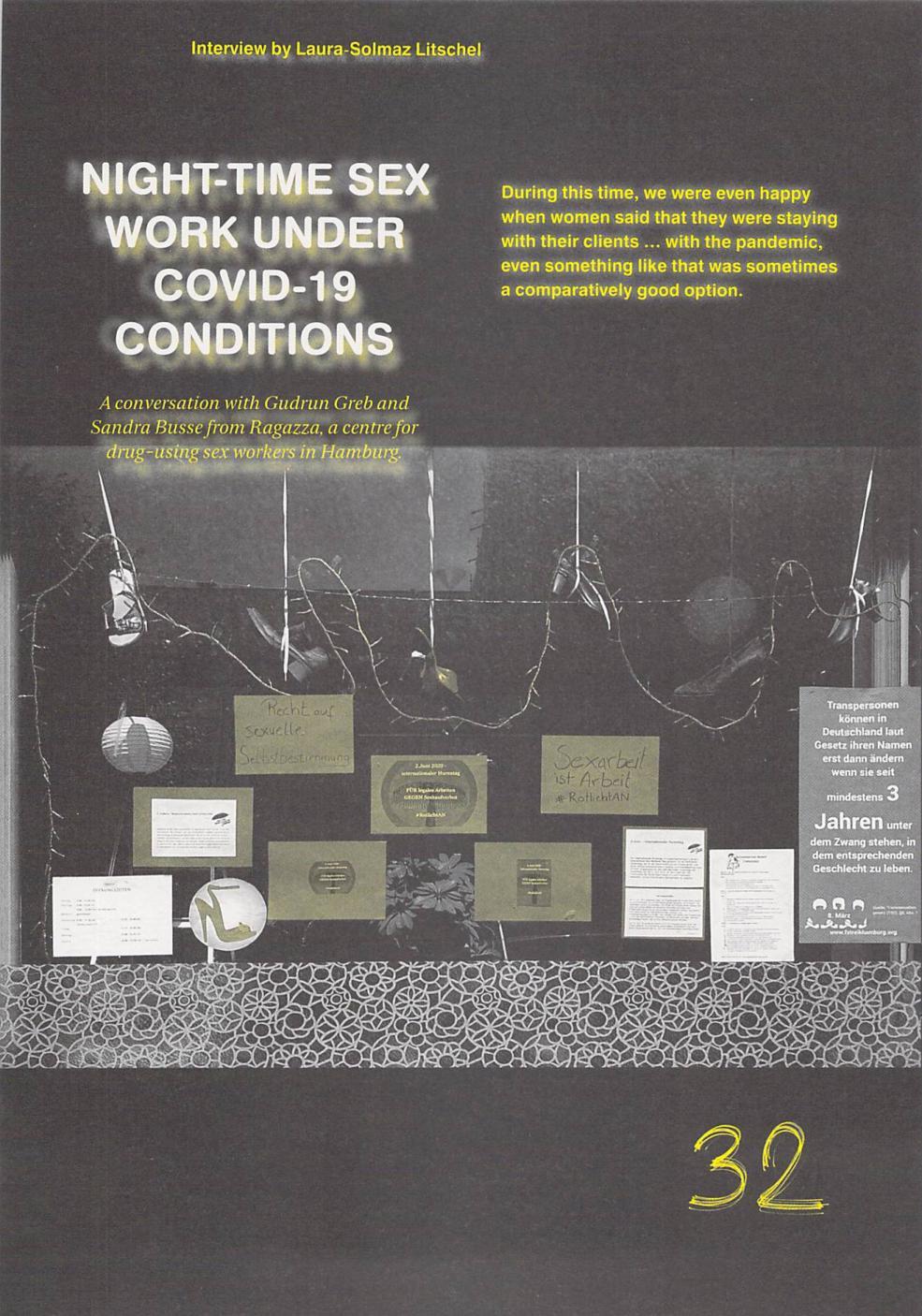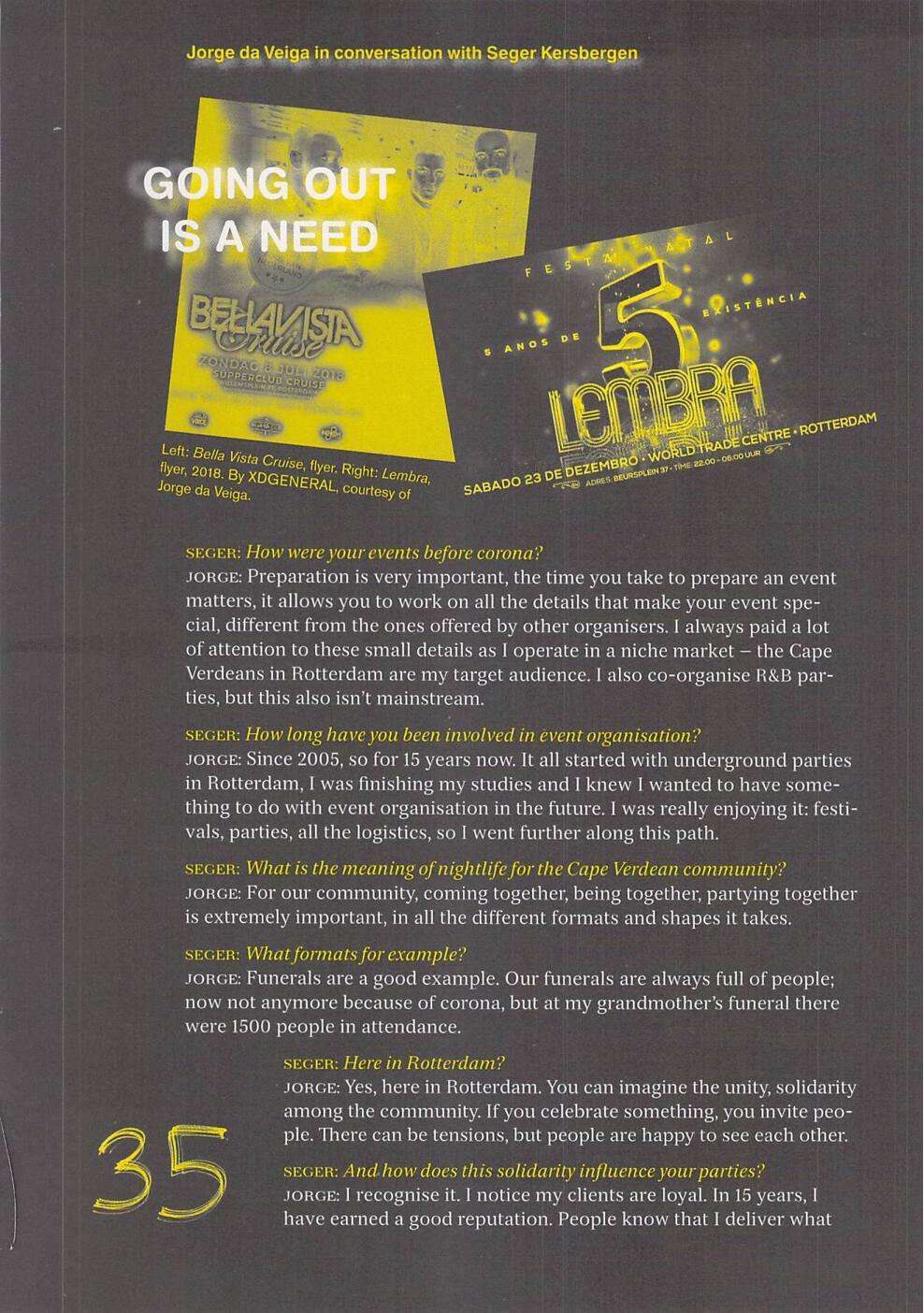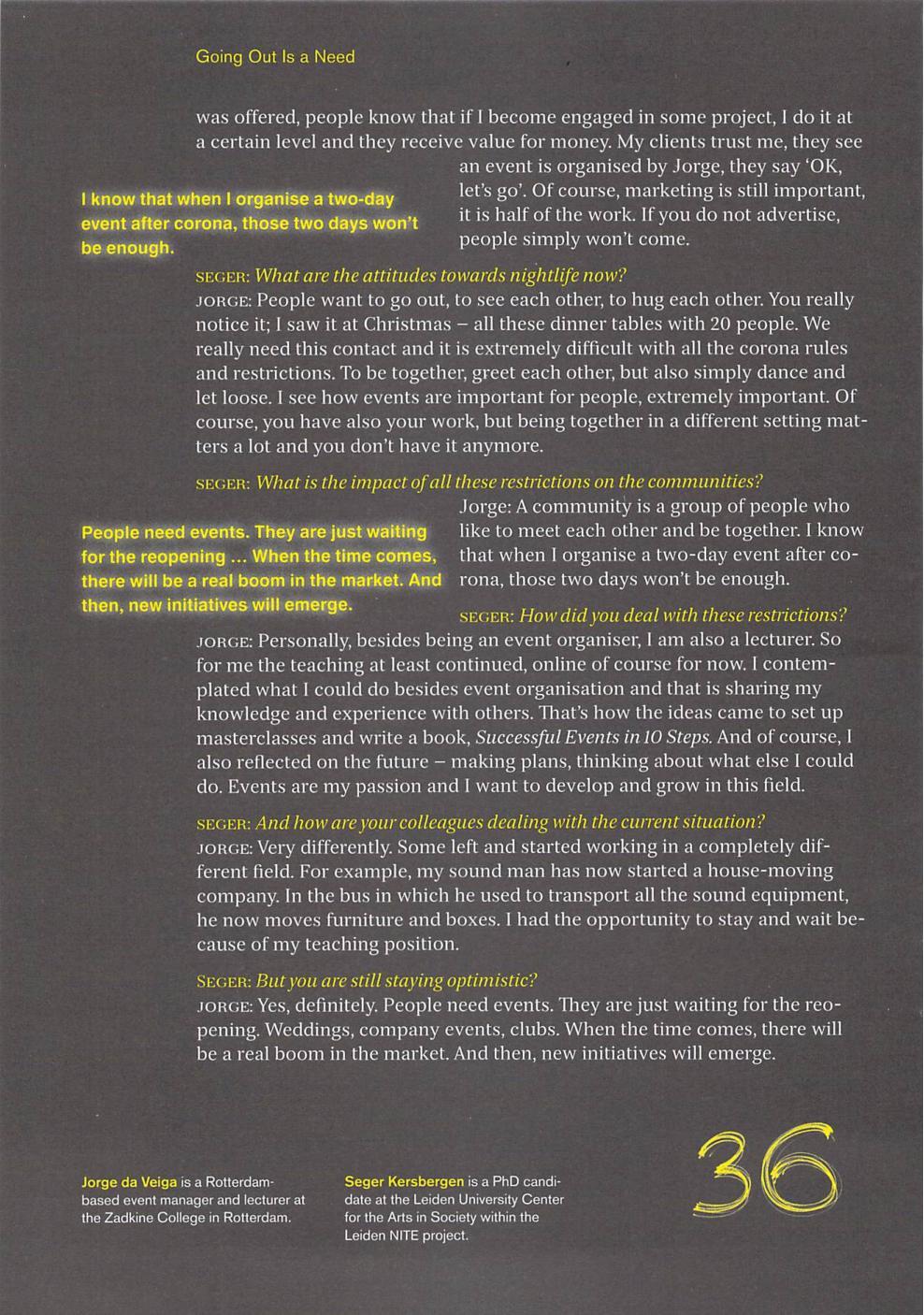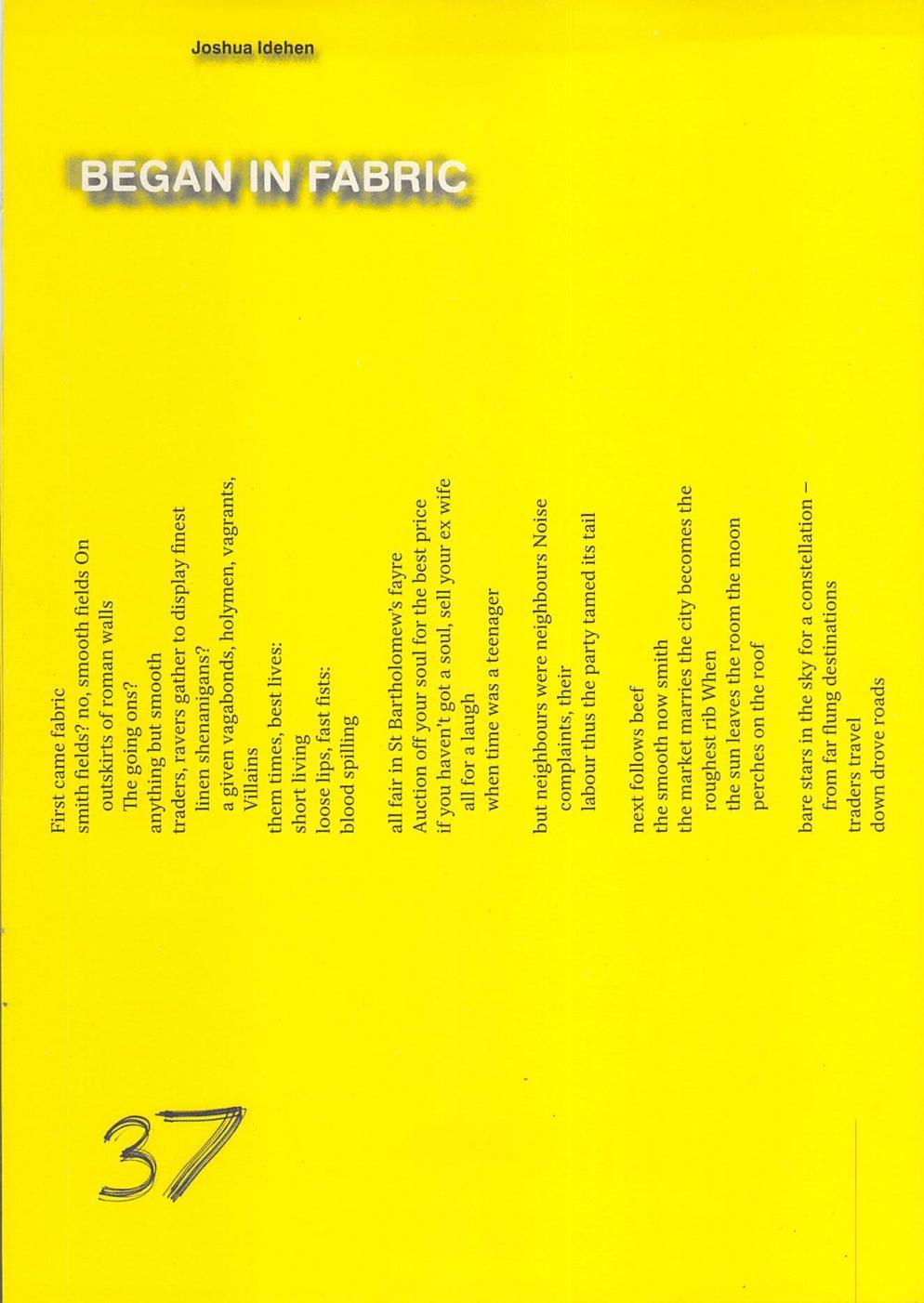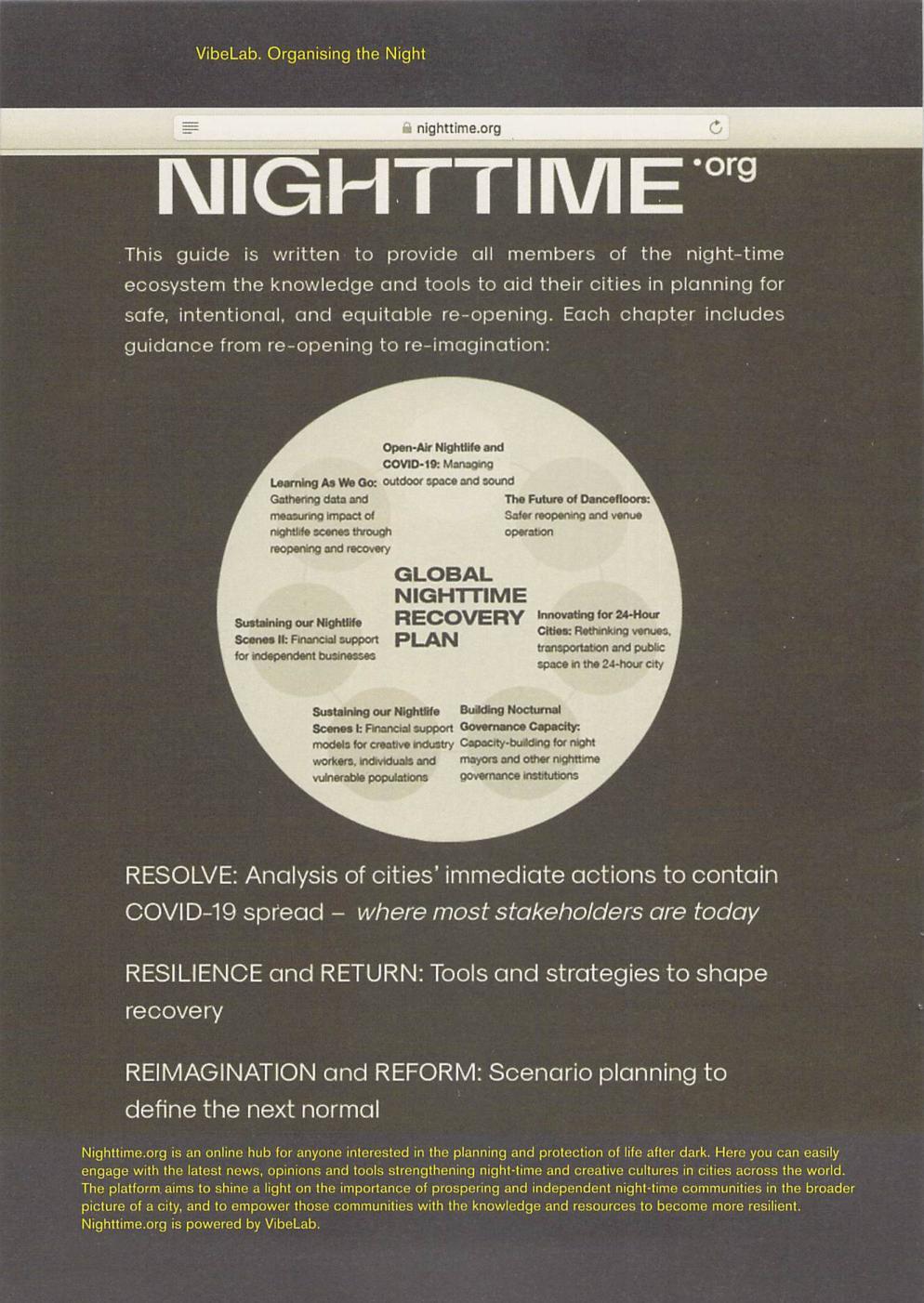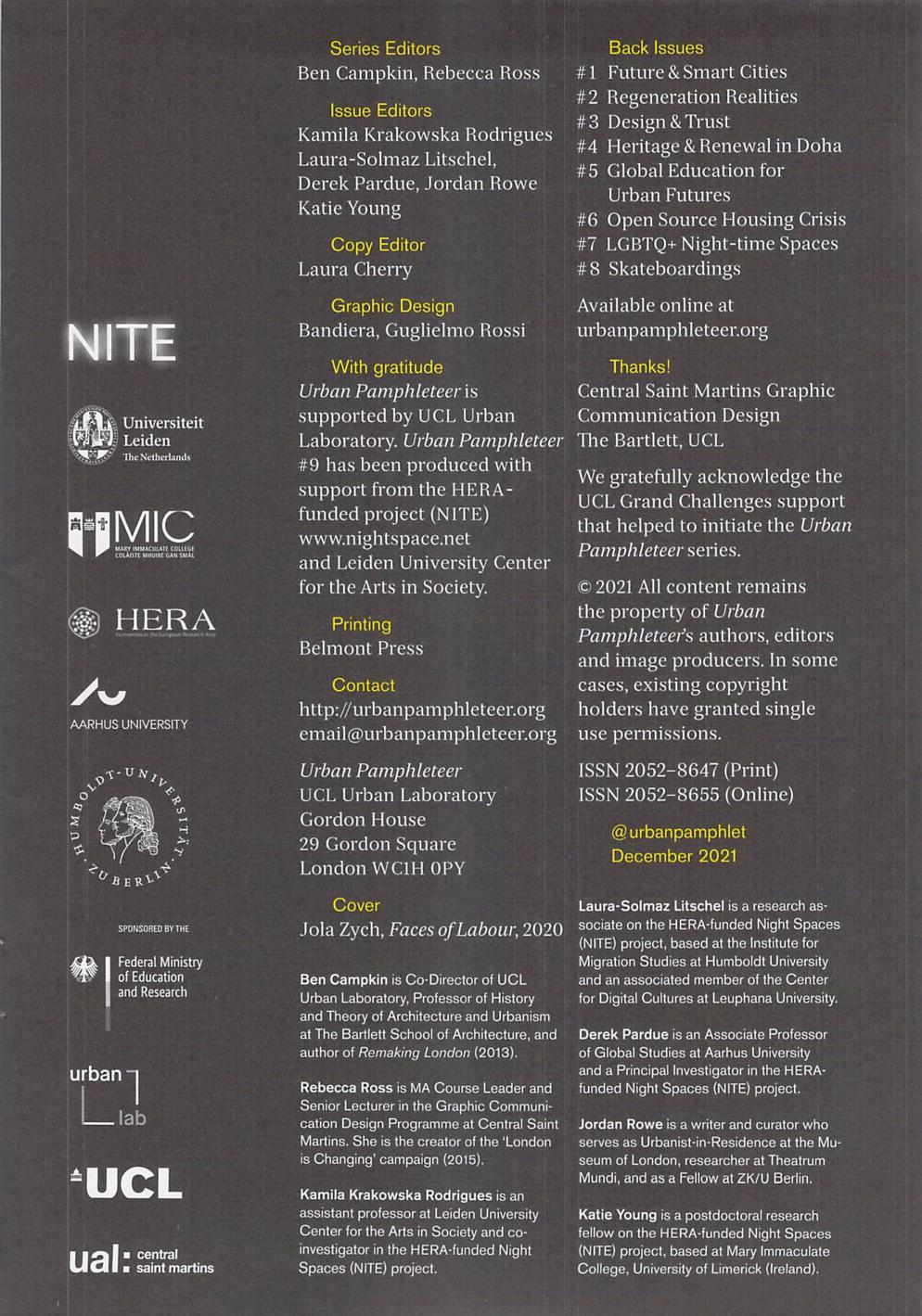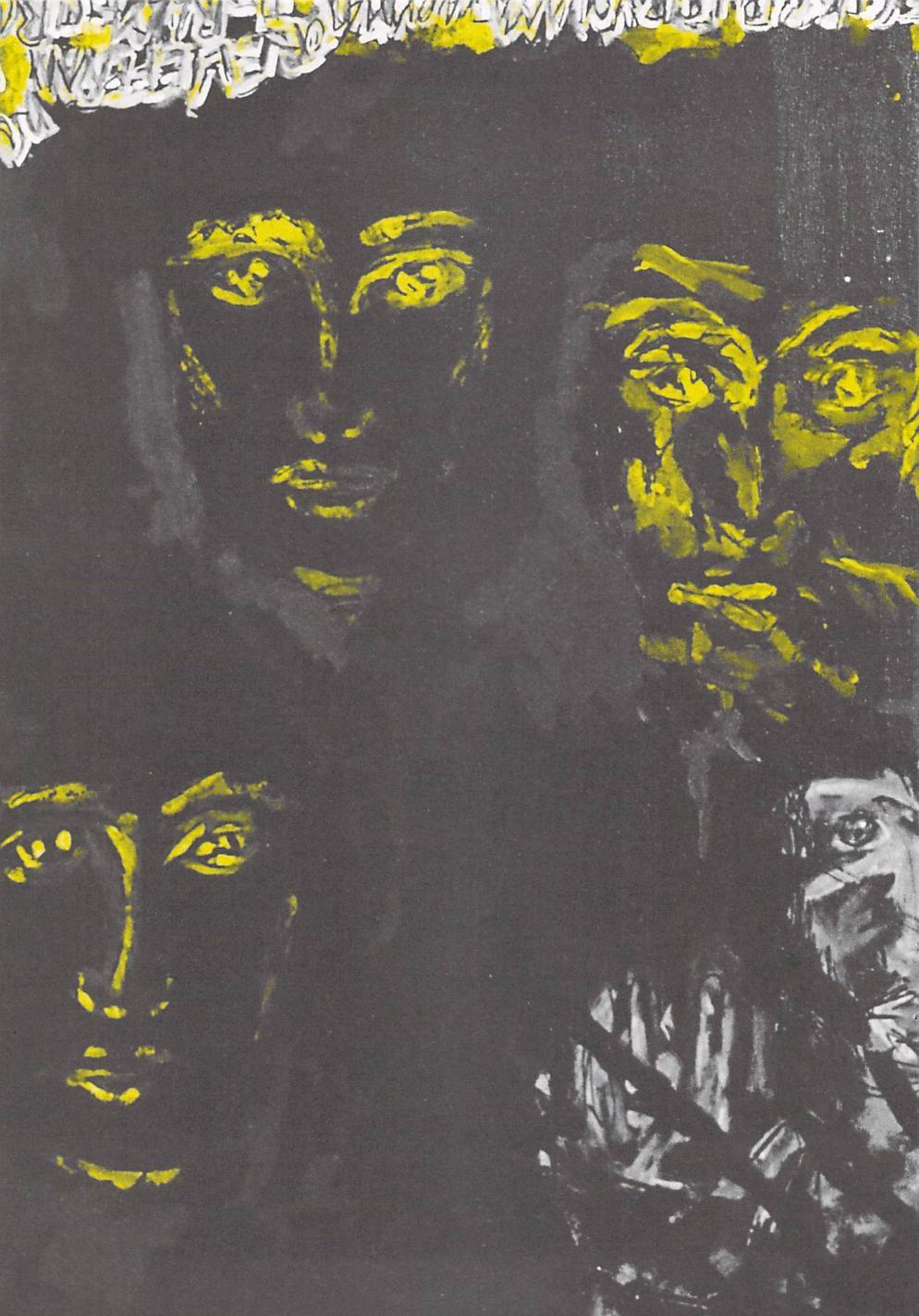Urban Pamphleteer 119:Rei111aginingthe Night
Kamila Krakowska Rodrigues, Laura-Solmaz Litschel, Derek Pardue, Jordan Rowe, Katie Young
We are delighted to present Urban Pamphleteer #9
In the tradition of radical pamphleteering, the intention of this series is to confront key themes in contemporary urban debate from diverse perspectives, in a direct and accessible -but not reductive-way. ·n1e broader aim is to empower and inform citizens, professionals, researchers, institutions, and policy-makers, with a view to positively shaping change.
#9 Reimaginingthe Night
1l1e advance of the COVID-19 pandemic has led to the imposition of unprecedented emergency measures: night-time curfews, the closure of after-dark venues, and laws designed to prevent nocturnal activities and control the 111ovementof populations. Across Europe, the pandemic has coincided with multiple political crises, amounting to the greatest set of restrictions on public life since the mid-twentieth century.
E111ergencymeasures have interrupted the growth of policy initiatives supporting night-time urban cultures in many European cities. 1l1e devastating consequence of lockdown measures on nocturnal economies has been well reported, but to what extent have social practices, and spaces, been impacted and adapted amongst communities who have mobilised around migrant identities or histories?
Urban Pamphleteer 119is initiated through a research project 'Night Spaces: migration, culture and integration in Europe' (NITE),1 which asks how night spaces are imagined, produced, experienced and narrated by migrant communities in Europe. Taking into account recent attention to the urban night at the policy level, as well as the impact of COVID-19, this issue engages perspectives from nightlife cultural organisers and associations, artists, industry representatives, policymakers, scholars and others who share their experiences and ideas on the future of night spaces. What is being done to create, protect, or sustain night spaces, scenes, and economies for migrant communities across Europe, and what is being overlooked? How has the pandemic altered the parameters of public/private space at night and notions of home? How have migrant communities, in particular those who face intersectional vulnerabilities and oppressions, been impacted by changing legal and policy frameworks? What grassroots social responses have emerged to address the impact of lockdowns on migrant groups? 1l1ese are some of the questions that contributors address.
1l1e pandemic has brought to attention inequalities that have long existed across Europe's multicultural urban landscapes, including the devaluation of night-Lime labour, often undertaken by those from migrant backgrounds, and the demonisation and disproportionate criminalisation of people of colour. 1l1is issue seeks to demonstrate the practical changes that are taking place as a result.
1 www.nightspace. org. The NITE project (Night-spaces, Migration, Culture and lntegraion in Europe) is funded by Humanities in the European ResearchArea (HERA) [2019-2022(.
home to stay safe is an oxymoron for so many people, also for women and children suffering from abuse, For example. But with this LGBTQ+lens on, this idea that somehow staying at home is safe - it's not: we've had to leave our homes, be they just up the road or be they on the other side of the world. As a· result, we've created a community of LGBTQ+people, including migrants who arc non-geographical. TI1erc's a lot of talk about the importance of community and people often think about it as their locality, the surrounding streets in their neighbourhoods, where we don't have that luxury as LGBTQ+people. Because those streets might be incredibly dangerous to us. So we have to think about community differently, we have to think about home differently. 'nrnt is why we are disproportionately migrants lin London!. I think.
TI1e night is so important to migrants, and LGBTQ+migrants particularly. Firstly, it's an opportunity for work. TI1e night has always been a time of opportunity. And I see it as a time that is not used to its full potential. So often we spend time talking about the 'graveyard shift' or, putting the night down as a dark or scary place. And certainly, other people's reticence around the night has created opportunities for LGBTQ+people to carve our own spaces out of the time that nobody else seemed to want.
t::,.I've been focussing the past couple of weeks on LGBTQ+spaces and small businesses, and really trying very hard to make sure that when lockdown is lifted and when it's time to reopen our bars, clubs and pubs, that we're able to do that. TI1osc arc really important social spaces but also employers: big providers of jobs for us at night. And it's really tough. But some of the things that I've been working on are trying to get rent relief for small and medium enterprises, so we have been able to get some pro-bono legal support for LGBTQ+spaces that are having problems with their landlords not giving them rent relief.
,r For LGBTQ+bars, pubs, and clubs, but eve1yo11eacross the board - a) they don't want to open until it's totally safe to do so, and b) no-one really wants to open with social distancing in place. Because most of our spaces, particularly the queer ones, arc running on very, very, very tight profit margins. And they might depend on the last 10% of people walking through the door - that's the difference between them making a profit and losing money. You know? And I think it's clear, we need to make it clear, that making a profit isn't bad; it enables places to carry on and employ people and do good things. I'm not talking
about these big shareholders or anything, I'm talking about our community spaces. It's important that we support them and that they can make a profit.
§ Will these new innovations and online streaming stick? I'm not so sure. 'Cos I don't know about you, but I'm pretty sick of looking at screens and I am desperate to get out and experience things live.
'le ""-"'fMADc M\AT~N,- 1-t0Pf'M ~c.~\NE' S -
H ot-lif MA l>f" M \.ATAN!'f o Pi" MA, J..IINF
tfME2LfN'!, i - 1\11,\i>TJ"f" 11\A"TONOMC) \IS
\)Ati" l P,4',tJ t 'I Pf'R. Fe, CMANCf' - -----
sketchbook to mass legal reform and social justice movements. But whatever the scale, there arc certain attributes that seem to work well in making a hope machine more powerful and effecThese,projects could.all be descrlbed·as tive. Using participatory performance, for 'homemade:mutant hope machines:: forms·and instance, can be a potent way of strength- ' processes that emerge from lived e_><perience, OP-erate.relatlvely,autonomousty, adapt to ~han~ing condltl~ns and1routinely,,generate belief in.the possibility of better worlds. cning community and modelling agency. It's also worth taking fun seriously: it's a surprisingly powerful technology for both intervening in existing civic structures and creating new ones. And embracing queer family models of belonging and care can facilitate material support and enable the transmission across generations of valuable, hard-won forms of understanding and action.
Some of the finest examples of homemade mutant hope machines take the form of queer urban club nights. 11,e most powerful example of all might be the North American Ballroom community. Duckie's Saturday nights, mean-
Embracing queer, family models of, belonging and care can facilitate.material support and enable the transmission across g~nerations of.va!uable, hard-won,forms of understanding and action.
while, have been running at London's Royal Vauxhall Tavern for a quarter of a century. And there arc so many others - basically anything that offers a vehicle for distinctive, collective queer pleasure, support and world-making that wasn't there before.
In London, this includes nights created to serve specific racialiscd or migrant communities, from the Shim Sham Club in the 1930s to Club Kali since 1995 and more recent nights like BBZ, Hungama, Slav 4 U, and Homos and 1-loumous.
ll also includes virtual nights that sprang up under lockdown conditions, most notably Queer House Party, an online event offering novel spatially distributed, digitally enabled forms of relationality and solidarity, through dance music, drag performance, social interaction and related forms of offline daytime mutual aid. Indeed, the queer value of mutation and material support has been thrown into relief by the pandemic, through the development both of forms enabling short-tern, support and forms with long-term benefit (for example, the way digital events can expand some kinds of accessibility).
When I finished my research and became 'Dr Duckie', we hoped to tind ways to share these ideas beyond the academy. So we adapted my PhD thesis into such forms as an interactive talk and a mini-zinc. Both of these use the illustration that accompanies this article -a one-page schema or 'cheat sheet' of the key concepts of homemacle mutant hope machines.
·n,ere's more (including the thesis itself, if that's your bag) at duckie.co.uk/dr-duckie.
Ml REPUBUCA r"' PORTUGUESA ~-
IGAI --
INSPE~AO-GERALDAADMINISTRA~AOINTERNA Gablnetedalnspetora-Geral
Police activity aims to ensure the security conditions for the free exercise of fundamental rights by all members of the community. With the right of coercive power, police forces act often on the difficult boundaries between the possibility of the use of force and the respect for fundamental rights. Objectively, the police force's duties fit into two contexts: maintenance of security (a constellation in which the use of force is close to situations of self-defence); and civil protection (a constellation in which the use of force is close to situations of the right of necessity). In the current pandemic context, there are also restriciions to the individual rights of the community members, such as a dynamic curfew in various periods of 2020 and 2021.
Society enters confinement. Police forces continue their activity. There is an increasing need for necessary measures and cautions to combat the spread of the disease. In this scenario, police activity, already difficult and complex, faces new challenges. Everything must be done immediately, now at the pace of demands that are always new and sometimes even surprising.
The control of police activity parallels police activity itself. There are several entities that cany out such control. There are control centres that collect data on police activity which can then constitute grounds for useful recommendations or red flags that will have to be taken into account by political decision-makers. However, other entities, namely those with disciplinary competence (such as the Inspectorate General of Home Affairs, or lnsper;ao-Gera/da Administrar;aolnterna), maintain the power of intervention as far as their competences go.
In this regard, training is an area which cannot be neglected and the Inspectorate General of Home Affairs dedicates special attention to this. Awareness of and/or detailed explanation of the circumstances in which police activity must take place, are also areas in which the Inspectorate General of Home Affairs tries to provide answers whenever it is deemed necessary and useful. In what concerns disciplinary aspects, intervention is subject to legal criteria and procedures. Criteria concerning the instruments of intervention involve authorisation only through the procedural models foreseen by the law. Criteria concerning these legal procedures concerns the production, gathering and valuation of evidence. The police officer is, in procedural terms, a defendant, with the inherent statute.
That statute comprises a fu_ndamentalprinciple of the sanctioning law, which determines that, whenever there is doubt, the decision must be in favour of the defendant (in Latin: in dubio pro reo). This is an essential non-negotiable rule in a democratic state based on ~e rule of law, which cannot be compressed or restrained regardless of the circumstances. And it is a constraining factor on disciplinary action in this area.
Thus, the sanctioning law assumes this double trait: on the one hand, it ensures compliance with the functional duties of each police officer and, on the other hand, but not less importantly, it ensures the safeguarding of the rights of all citizens, including police officers that face disciplinary action. Clearly, this perspective remains unchanged in a pandemic .context. The specificity that is felt is that of the follow-up of new complaints and new restrictions inherent to the pandemic situation.

In this context. the pandemic poses particular challenges to police activity (and control thereof) regarding foreign citizens. The law regarding foreign citizens imposes restrictions of movement on third countries' citizens within the national territories of the European Union. Accordingly, the implementation of forced returns of citizens. carried out by border police forces. takes place when, by administrative orjudicial decision, they must leave the national territory. Since 2015, the Inspectorate General of Home Affairs has been in charge of monitoring those return operations, which are carried out by the Immigration and Borders Service (Se111i~·o de Estra11geiros e Fro11teiras - SEF). Forced return monitoring operations occur in the presence of inspectors of tl1eInspectorate General of Home Affairs during the operation. who verify compliance with the regulations, as well as the respect for the fundamental rights of the person to be returned.
ln a pandemic context, these operations face several constraints. including the temporary closure of airspace. This is an area of particular tension, between the security solutions that the states do not relinquish, and the effective respect for the fundamental rights of all citizens.
We must underline that the new reality imposes several challenges. First of all, the challenge of individual and collective safety. Then, with the pandemic. there are new kinds of complaints. new conflicts. new needs, from members of the community and from members of the security forces and services. All this, under the auspices of a democratic state based on the rule of law, must include intransigent respect for the dignity of all individuals. There are, obviously, alternatives to the democratic model. However, none, throughout human history. has proven to be better.
As the darlmess
Envelops the cellar I think about labour
And how it scarcely gets better
My hands trenible
Charging Red Lights
Scared to the bone by Mannequins being disguised
As the Darkness, Penetrates them and My body, I become an Entity Roughly somebody Never /mew that being My own Boss Would cost me this Much
But being a Role Model
For my Children has Been the horizon
To continue this path
Still the Hope in my Veins
Shining greener than ever
It's dangerous to feel like You are someone who matters
It has become clear,how.ll~le value lowthreshold social work has in society when our funding.is cut or.we.dona gt!t protective equipment.
Has the transformation of the urban night during the COVID-19 pandemic affected the situation for sex workers?
Public space has emptied out, especially at night. Some women ask us to open earlier because there is hardly anyone out during the night, and hardly anyone after 12pm. We have therefore changed the opening hours from 7pm to 10pm. Violence has increased; we have had to deal with women being raped; and of course since the beginning of the pandemic they arc at greater risk of being snatched, with fewer people around. Women are now entering less secure places to work and consume.
At the beginning of the lockdown in 2020, many facilities closed down. This meant that we hardly had a chance to arrange sleeping and living spaces for the women. During this time, we were even happy when women said that they were staying with their clients. If a woman told us that she had met someone on Facebook and wanted Lo stay with him for a few clays, suddenly we would say 'that's lucky, at least you have a place to stay'. Under normal non-pandemic conditions, we would say 'that's loo dangerous, you don't know the guy', but with the pandemic, even something like that was sometimes a comparatively good option.
There were also prison releases of sex workers due to the pandemic, correct?
Yes, some. lllese were sex workers who were in prison for engaging in sex work with the aim of 11nancing their own drug consumption and survival on the streets, or because they worked in places where sex work is prohibited, for example in the St. Georg district near Hamburg's main railway station. Because of the pandemic, those women who were in prison for minor offences were released from one day lo the next. TI1e idea was to empty the prisons so that fewer infections would occur there. Some of these were people who had no place of residence and while in prison were put on substitution therapy. TI1ey were then simply put out on the street and had to 11ncl somewhere to stay. ·n1ey had no accommodation, no substitute, simply nothing. Some people ended up completely on the street and were totally destitute after a short time. Here in Hamburg, there was hardly any supply at the beginning because many facilities were closed due to the pandemic. in addition, there were completely different problems caused by the pandemic: there was no income for the women any more. -n1ey could no longer beg because the SBalrn trains were empty. TI1cy couldn't steal because the shops were closed and they couldn't prostitute themselves either, because it became generally prohibited and there were hardly any customers left on the streets. TI1isis all because ofCOVID-19.

How has the situation been for you as a sex work support organisation since the pandemic?
At the beginning of the pandemic, we didn't have respiratory masks and protective clothing, which was difficult because drug-using sex workers are a particularly vulnerable group. Now we have enough

equipment and FFP3 masks, but it took time. To avoid infection, fewer sex workers can come to the facility at the same time than before. We also had to do away with overnight stays and we have to constantly make sure that we keep adequate physical distance. Additionally, there arc always women who do not want to, or arc unable to, leave the centre. 1l1is means that sometimes there is a long queue at our door because while some arc inside, others have to wait. 1l1is kind of thing is dangerous under COVID-I9 conditions. Protecting the women from infecting each other is exhausting, but the low-threshold support and corn1selling work we do here is also becoming more difficult. Try comforting a woman who has experienced massive violence with the prescribed one and a half metre distance. You can hardly say: 'Yes, what happened to you is terrible, but don't get too close to me'. 1liat's not how support work is clone. Many of the women arc overtired from life and 24/7 work on the streets, and want to rest at our place. 1l1is is also difficult with corona regulations. For example, how should we deal with a woman falling asleep at our table in the common room? Normally we would take her to one of our beds, but that is no longer possible because we had to close the sleeping areas clue to the COVID-19 regulations. So, whether it is clothing, counselling, or food, all our work has been rearranged and we have had to react flexibly to ever-changing conditions.
As an organisation, do you feel that the importance of your work is being seen in these difficult times?
At the moment, it is always said that corona makes it clear who the real heroes and heroines of everyday life are. Shop assistants are applauded as well as nurses caring for older people. At the same time, this work is otherwise always totally devalued. Here, too, it has become clear how little value low-threshold social work has in society when our funding is cut or we don't get protective equipment. I think there is a connection between this lack of support and the values people have in our society. Sex work has always had held a stigma around spreading diseases. 1l1e COVID-I9 pandemic is no different. Such stigmatisation against sex workers is reproduced again and again although it has no empirical basis. At the same time, too little is being done to protect drug-using sex workers and those who work with them from infection. 1l1c pandemic has changed public space and the urban night, so il has had a serious impact on sex workers. 1l1e already dangerous lives of drug-using sex workers have been made even more dangerous by the pandemic.
Gudrun Greb is the managing direc· tor of the association Ragazza.
Sandra Busse has worked as a social worker in the project for more than 20 years.
First came fabric smith fields? no, smooth fields On outskirts of roman walls ll1e going ons? anything but smooth traders, ravers gather to display finest linen shenanigans? a given vagabonds, holymen, vagrants, Villains them times, best lives: short living loose lips, fast fists: blood spilling all fair in St Bartholomew's fayre Auction off your soul for the best price if you haven't got a soul, sell your ex wife all for a laugh when time was a teenager but neighbours were neighbours Noise complaints, their labour thus the party tamed its tail next follows beef the smooth now smith the market marries the city becomes the roughest rib When the sun leaves the room the moon perches on the roof bare stars in the sky for a constellationfrom far flung destinations traders travel down drove roads
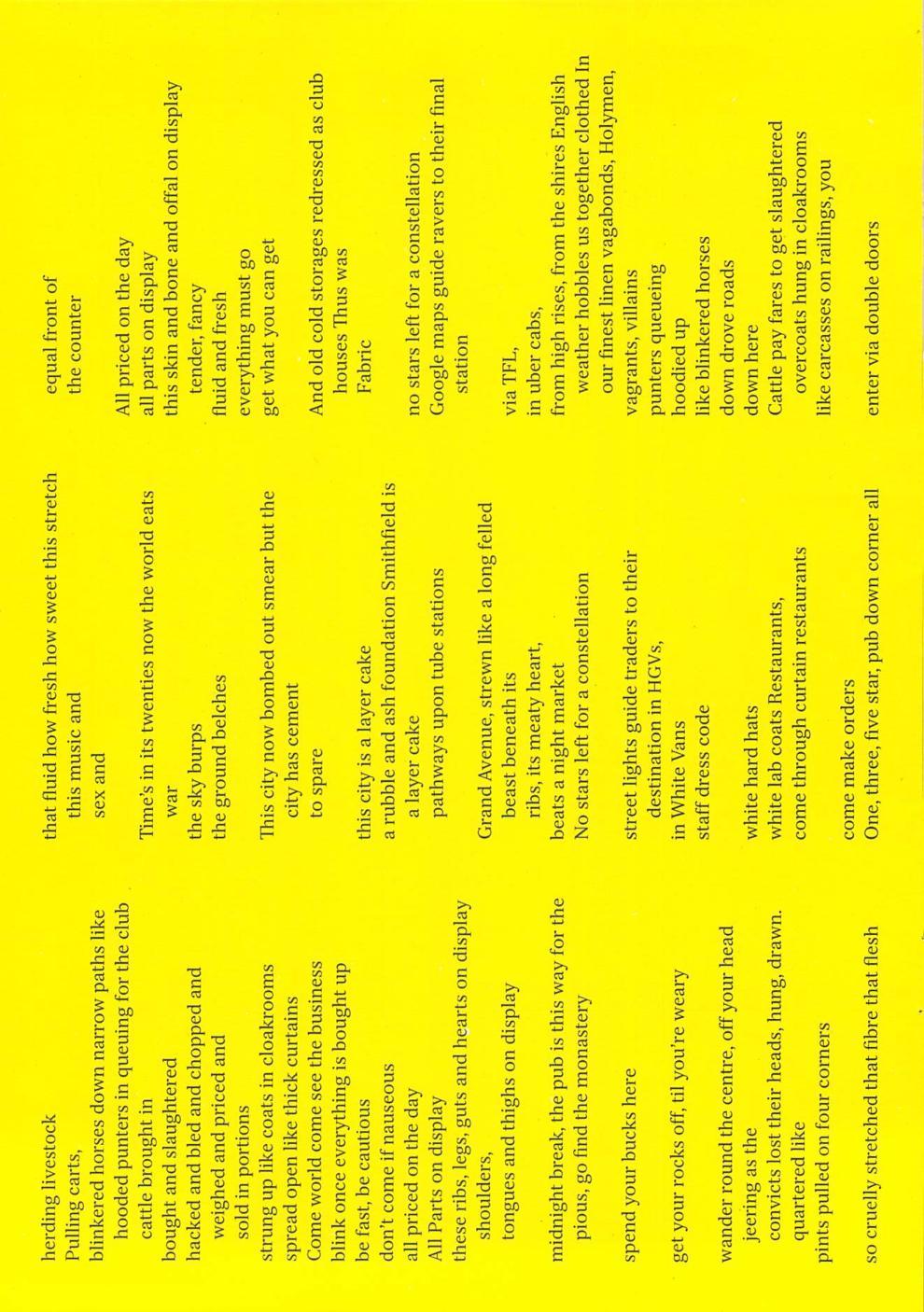
All priced on the day all parts on display this skin and bone and offal on display tender, fancy fluid and fresh everything must go get what you can get And old cold storages redressed as club houses TI1us was r-abric no stars left for a constellation Google maps guide ravers to their final station via TFL, in uber cabs, from high rises, from the shires English wealher hobbles us logether clothed In our finesl linen vagabonds, Holymen, vagranls, villains punters queueing hoodied up like blinkered horses down drove roads down here Callie pay fares to get slaughtered overcoats hung in cloakrooms like carcasses on railings, you enter via double doors
herding livcslock Pulling carts, blinkered horses down narrow paths like hooded punters in queuing for lhe club caLtlc brought in bought and slaughtered hacked and bled and chopped and weighed and priced and sold in porLions slrung up like coats in cloakrooms spread open like thick curtains Come world come sec the business blink once everything is bought up be fasl, be cautious don't come if nauseous all priced on the day All Parts on display these ribs, legs, guts and hearts on display shoulders, tongues and thighs on display midnight break, the pub is this way for the pious, go find the monastery spend your bucks here get your rocks off, til you're weary wander round the centre, off your head jeering as the convicts lost their heads, hung, drawn. quartered like pinls pulled on four corners so cruelly stretched that fibre that flesh that fluid how fresh how sweel this slretch this music and sex and Time's in its twenties now the world eals war the sky burps lhe ground belches TI1is city now bombed oul smear bul lhe city has cement to spare this city is a layer cake a rubble and ash foundation Smithfield is a layer cake pathways upon tube stations Grand Avenue, slrewn like a long felled beasl beneath its ribs, its mealy hearL, beats a night market No stars left for a constellation street lights guide traders to their destination in HCVs, in White Vans staff dress code while hard hals white lab coals Restauranls, come through curtain restaurants come make orders One, three, five star, pub down corner all equal front of the counler

In a moment of silence you can hear the trains howling past sometimes the oomph from the bass from the DJ's track bump bump on the lop floors of tower blocks Concrete conducts Bass, you sec No matter what walls built what fences what luxury flats the frequencies with eed through the brick and yes, Neighbours will neighbour noise complaints, will labour Time ages problems remain the same Down Charterhouse they found bodies buried long ago perhaps it was the plague but this is not that poem perhaps it was a rave
1l1is fluid on flesh this chorused hot sweat this grime pumped neck this screw face flex whatever comes next I'm ruined I'm wrecked brief intimacy in dark corners sticky floors, drums, bass punctuated by broken men wailing down phones at Sam communion in stale air'd churches faces blur but not the focus not the smiles, not the love in this moment it's all love in this moment, thats enough bass make a perfect ripple a fairy's circle the buzz will lose you if you ever stop so never stop but then you do now you're a decade cold wondering when lime got old mutton and scruffy buttons strung together by memories Was sixteen when 1 came here the church played yellow submarine was fifteen when I.first snucll in sharing rizla on the staircase 1 wore nothing cepc for swimwear And the Toilets were a madness and if you fall asleep they cart you off to A&E He's Ullrainian I'm kenyan just met just now down in room three
two fingers glock the dry ice two fingers pinch a cigarette two fingers purse the wet lips Lwo fingers wipe the hot wet Strobe light technieolor DJ curates the score MCs on pulpit beckoning the hordes 140 bpm rattling the floors the masses roar pulled apart by 808s second glances, dirty necks, Heady hearts. a slice of I usl, the pop of ear, the speakers hum Plastic cups and spiced rum and ginger beer and dirty whispers, stank face, no respite distant laughter, spill beer brethren, mate don't step on creps, no space to pose no shaking hands, just bop and nods popping shoulders shaking thighs On a high, In the fray all feelings on display all love, vibe, rage and joy on display delirum, energy and courage on display
Kano's dropping layer cake
1l1is Fabric is a sweatbox 1l1is Fabric is a layer cake garage on the top floor dubstep in room two bangers on the dance floor
